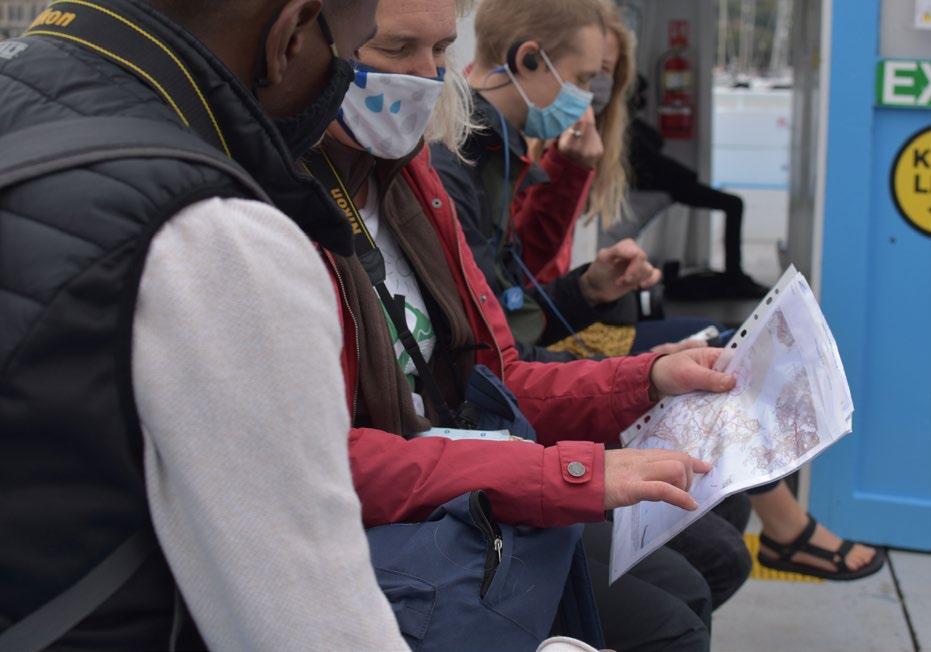
75 minute read
Chair’s Report
2020 has been dominated by the impact of the Covid-19 Pandemic, with sad loss of life, and deep social and economic disruption. The Board of Trustees and staff team reviewed the implications for the Association as the situation unfolded, with staff quickly moving to homeworking and all meetings held online from mid-March.
Group wearing face masks on the Cremyll Ferry ahead of Coast Path walk. Photo by Fotonow Early on during the pandemic, the Board of Trustees, advised by the Director, considered whether it would be appropriate to furlough all, or some, of the Association staff. The Board recognised the role that the Charity would need to provide as a trusted source of Covid compliant access information, in supporting our partner businesses where possible, sustaining the path condition in the face of normal winter erosion, and maintaining or adapting the charity’s income streams to ensure ongoing financial viability. Accordingly, the Board decided not to furlough Association staff. This decision has proved to be the correct one financially, for team unity, and in terms of our charitable responsibilities. Over 2020 the charity has had to respond to a rapidly changing world and circumstances unprecedented in our lifetime. This brought challenges to how we operate as a charity and changed not only how we worked over the year, but also our priorities and how we delivered them. Trustees agreed to postpone the AGM to 2021 and manage approval of the 2019 Report and Accounts remotely. A copy of the Annual Report and Accounts approved by Trustees and Members was submitted in accordance with normal Charity Commission requirements. Trustees also informed the Charity Commission of our decision to postpone the AGM under extraordinary circumstances. With no AGM, Trustees offered to stay on in their roles for a further 12 months to ensure continuity during
these challenging times. In addition, the Board co-opted three new Trustees with accountancy and health and wellbeing knowledge and experience. All charities were facing an uncertain fundraising environment. In May, the team joined the National 2.6 Challenge (created in response to the cancelling of the London Marathon) and established a campaign to show the importance of the Coast Path for people’s health and to reconnect with nature during lockdown. The success of this fundraiser set the groundwork for the launch of our Every Mile Matters campaign.
TOURISM AND HOSPITALITY BUSINESSES WERE CLOSED FOR SIGNIFICANT PERIODS OF THE YEAR AND WORKED UNDER RESTRICTED MEASURES WHEN ABLE TO OPEN, AFFECTING THE VISITOR ECONOMY ALONG THE SWCP.
We suspended our Business Membership and pivoted it into a new Way Maker scheme that highlights the importance of local businesses to the experience of those walking the Path. This helped the charity support one of the most adversely impacted sectors during the pandemic and build support for the Coast Path. Research into the economic value of the Trail was commissioned in 2020. This will indicate visitor spend levels, jobs supported and highlight the value for money from investing in the ‘green infrastructure’ provided by the Trail. Volunteer Area and Local Path Representatives undertook an annual condition survey along the Trail in the Autumn and Winter of 2019/20. Despite cuts in the core maintenance grant, the overall condition of countryside furniture remains around 80%, down from a peak of 84% in 2012. This reflects the significant extra investment in the Trail through the work of the charity and wider Trails Partnership, specifically the impact of targeted campaigns such as the Step Up and Find Your Way appeals. Demand to use the National Trail during the pandemic was high, initially with locals finding escape and then as domestic travel restrictions relaxed, with people looking to holiday within the UK. Issues were reported concerning the impact of people in the countryside and along the coast when many services such as car parks and public toilets were still shut. A significant priority was to ensure members and wider users of the Coast Path had accurate and timely information about access to the Trail in line with government coronavirus guidance. We upgraded of our website to become more mobile friendly and continued to grow our public reach through the Trailblazing magazine, e news and social media. This, together with national news and travel items across the media helped raise awareness of the role we play in protecting and fundraising for the Trail. A new Trustee Working Group was set up to help coordinate initiatives that promote the wider health benefits of walking the Coast Path, something the pandemic has helped focus attention upon during the year. Research on the economic impact of the health benefits of walking the Coast Path was commissioned with the University of Exeter. We continued our Connecting Actively with Nature programme to encourage wider use of the trail,
addressing equity of access and, while encouraged by the takeup of numbers, this was affected by Covid restrictions. This initiative offers great potential as we move out of the restriction measures in 2021. Natural England continue to co-ordinate the designation of the England Coast Path (ECP) National Trail with the Association reviewing and commenting on proposals. Unfortunately, these fail to address some of the access issues around South Devon Estuaries and we continue to seek improvements. Delays to ECP designation means that the Year of the Coast campaign has been pushed back to 2023, which now coincides with the 50th anniversary of the Association.
If there was ever a year to test the resilience of the Charity to support the Trail this was it! Trustees were particularly pleased with the team’s ability to adjust and deliver new programs of work to protect the Coast Path and actively fundraise for it. Despite the uncertain fundraising environment in 2020, individual donations, gift aid and legacies amounted to over £100k. Of note was a 200% increase in individual donations over £100 and a doubling of community fundraising donations from 2019. The team of staff and our volunteers responded quickly, having to adapt to working at home, in sometimes not ideal conditions. Care was taken to support the team’s morale, communications, and engagement during these turbulent times. A wider staff organisational review planned for 2020 was delayed to 2021 when it is hoped normal office working resumes. Our Business Plan budget approved in November 2019 set a deficit budget, as Trustees looked to use reserves to invest in path improvements and staff to generate further capacity to support the Trail. This budget was reviewed in April as the impact of Covid-19 became apparent. In common with many other organisations, the Charity faced significant challenges arising from the Covid-19 pandemic. However,
THE NATIONAL TRAILS PARTNERSHIPS CONTINUED TO SEEK FUNDING TO PUSH FORWARD THE DEVELOPMENT OF A CHARITY TO REPRESENT TRAILS ACROSS ENGLAND AND WALES. FUNDING HAS BEEN SECURED AND A DEVELOPMENT MANAGER WILL BE APPOINTED IN 2021 HOSTED BY THE ASSOCIATION ON BEHALF OF THE NATIONAL TRAILS FAMILY.
we continued to adopt a proactive approach to income generation and were rewarded by the receipt of additional grants. In addition, donations and member subscriptions were maintained at near budgeted levels. Expenditure on path repairs was lower than originally planned, as several schemes were delayed as a result of the impact of Covid-19 on the availability of contractors to undertake the work. These projects will be completed in 2021 including a proportion of £750k for four Rural Development Programme England bid-funded projects using £100k funding from the charity. The Association made available an additional £47k in 2020 for partner projects such as path surfacing, bridges, waymarks and steps. By the end of 2020 the Charity received total income of £540k and incurred total expenditure of £498k which resulted in net income of £42k. The total reserves held were £814k the scale of which were affected by a substantial legacy received in 2019. During 2020 the Charity has been able to show its flexibility and resilience and staff adapted their approach to the delivery of the Business Plan, resulting in a sound financial position at the end of the year. The pandemic and associated virus control measures will continue into 2021 and wider impacts to society and the economy even longer. The Board of Trustees reviewed the Business Plan in the second half of 2020, setting out how the charity will build capacity in 2021 to increase our resilience to these impacts and the other external risks, not least climate change. The revised Business Plan also reflects our ambitions to increase the equity of access post-Covid and ensure the National Trail is used to help with the ‘path to recovery’.
Between Portreath and Godrevy, Cornwall. Photo by Becky Millington
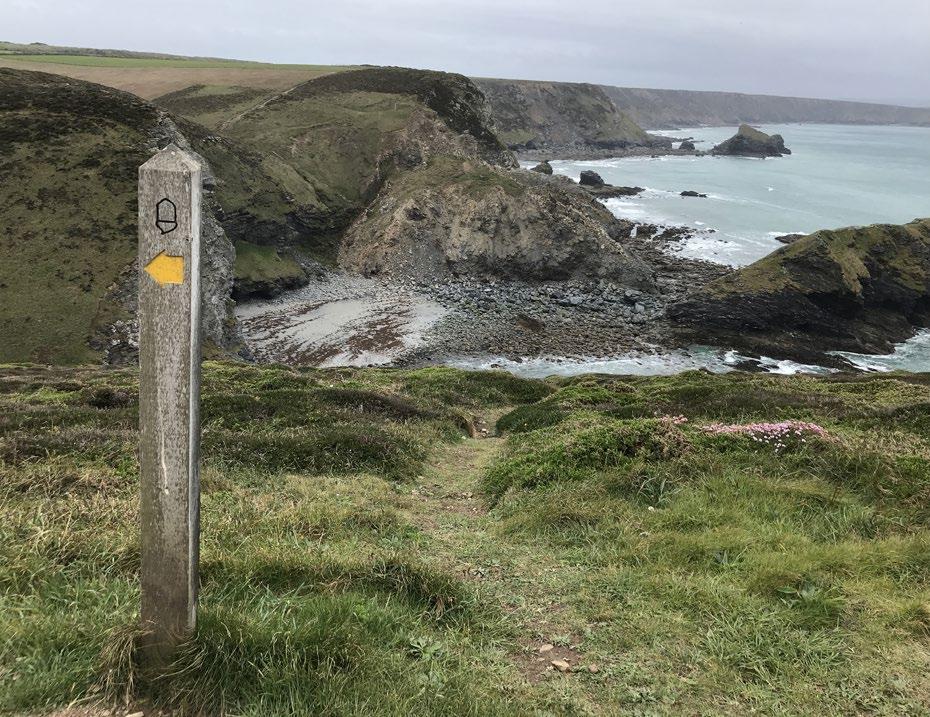
Objectives and activities
The Objectives of the Charity, as set out in the Constitution, are: 1. To secure the protection, improvement and conservation of the South
West Coast Path and public access to it in order to improve the health and wellbeing of the general public. 2. To educate the general public to a greater knowledge of, respect and care for, the coast and countryside by promoting the South West Coast Path. In furtherance of these Objects the Association aims to work for and assist in: • Providing information about the South West
Coast Path and its corridor to the public; • The effective administration of the organisation directed at the improvement and maintenance of the South
West Coast Path; and • Providing a forum in which different interests connected with the South
West Coast Path (including its corridor) and its use can discuss problems of mutual concern.
Starpoint Lighthouse, South Devon. Photo by Jason Way
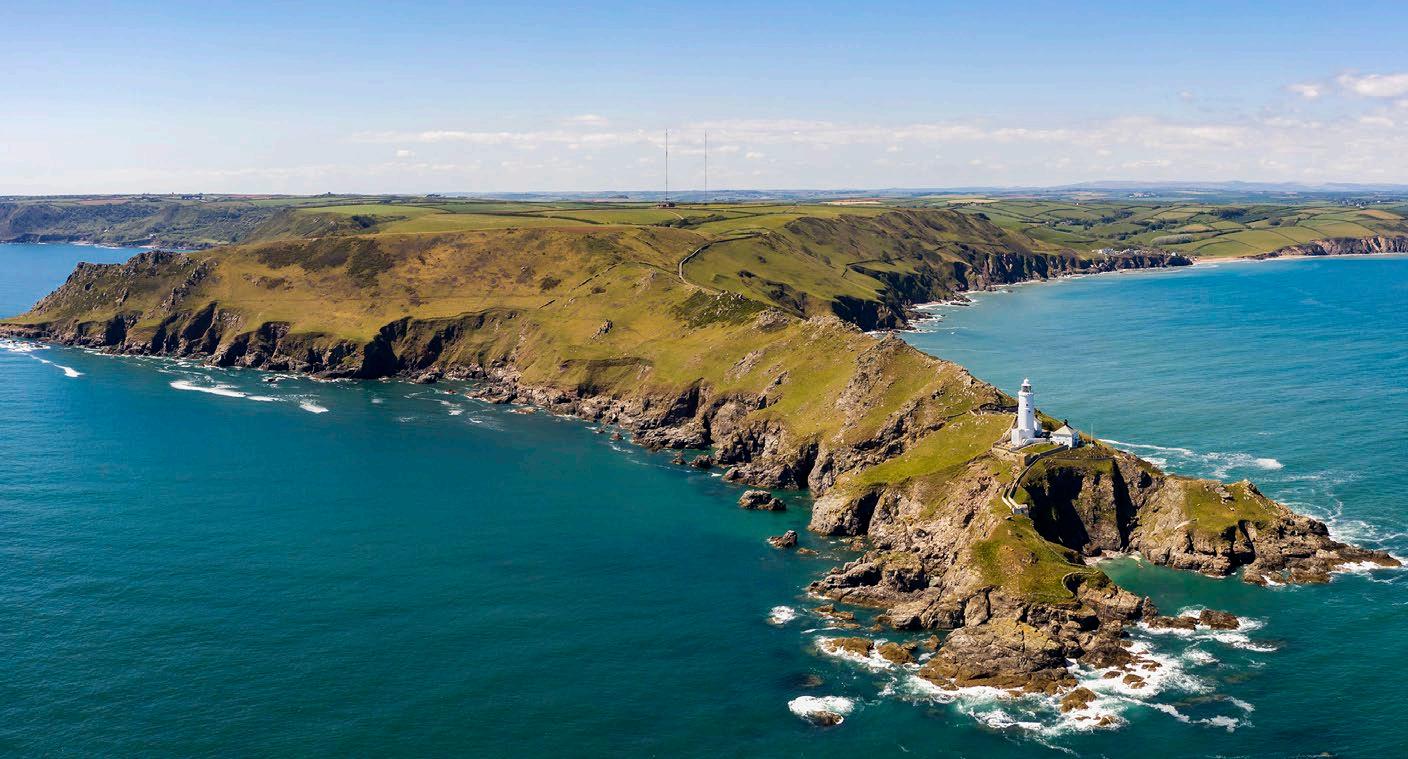
Vision and Mission
The Association’s Vision is to protect and improve the South West Coast Path as one of the world’s great trails, now and for future generations. In our mission to achieve this, we will champion the South West Coast Path to help people access, enjoy and protect the National Trail.
Our Strategies
As a charity we need to be self-sufficient in our core running costs. We also need to ensure efficient use of our supporters donations so that the maximum benefit is given to the Coast Path. To be as cost-effective in our efforts as possible, our strategies focus on working in partnership where practicable. Our business plan prioritises the following strategies:
Enhancement of the South West Coast Path National Trail
• Improve quality of access to and along the Trail and enhance health and wellbeing • Seize opportunities to improve the green infrastructure of the coastal margin • Support and coordinate the
Trail Partnership • Have a voice in the planning system to protect and enhance the Trail • Support economic activity that sustains the Trail • Advocate at a national level to support the family of
National Trails • Work at a regional level to support wider access to the coast and countryside
Engagement with people using and supporting the Coast Path
• Listen and give a voice to users of the Coast Path • Engage with people about conservation of the coast and countryside – helping create a sense of place • Inspire people to use and enjoy the Coast Path, promoting access for all
Capacity Building of the Association and SWCP Trails Partnership to support the Trail
• Fundraise to help protect, promote and improve the
Path • Provide a way for people to give back to the South West
Coast Path • Enable others to support the
Path to do more through leveraging of funding • Be bold to test new ideas to enhance the trail experience
Reporting Criteria 2020
The charity’s 5-Year Business Plan sets out financial and non-financial performance measures to ensure the Association is meeting its objects, vision and mission. The Business Plan was reviewed and updated between June and October 2019 with the revised plan adopted by the Board of Trustees in November 2019 setting out the strategic aims and objectives for the Association including a detailed action plan and budget for 2020. To ensure effective delivery of the Plan the 2020 review added an audit trail between strategies and action plans. Monitoring and evaluation measures introduced include reporting on delivery of outcomes against key targets to the Board of Trustees. A subsequent annual review of the Business Plan was undertaken in the second half of 2020 which will impact on the reporting criteria for the Trustee’s 2021 Report and Accounts. The three Sub-Committees of the Board of Trustees have responsibility for governance and oversight of delivery of one of each of the three strategic aims: • Path Committee - enhancement of the Coast
Path experience; • Membership and
Fundraising Committee - fundraising to support the
Coast Path; and • Finance and HR Committee - running the Charity. This 2020 Trustees Report has been structured to reflect the charity’s work across these three areas.
Chough flying between Zennor and Morvah. West Cornwall. Photo by Brian Shipman
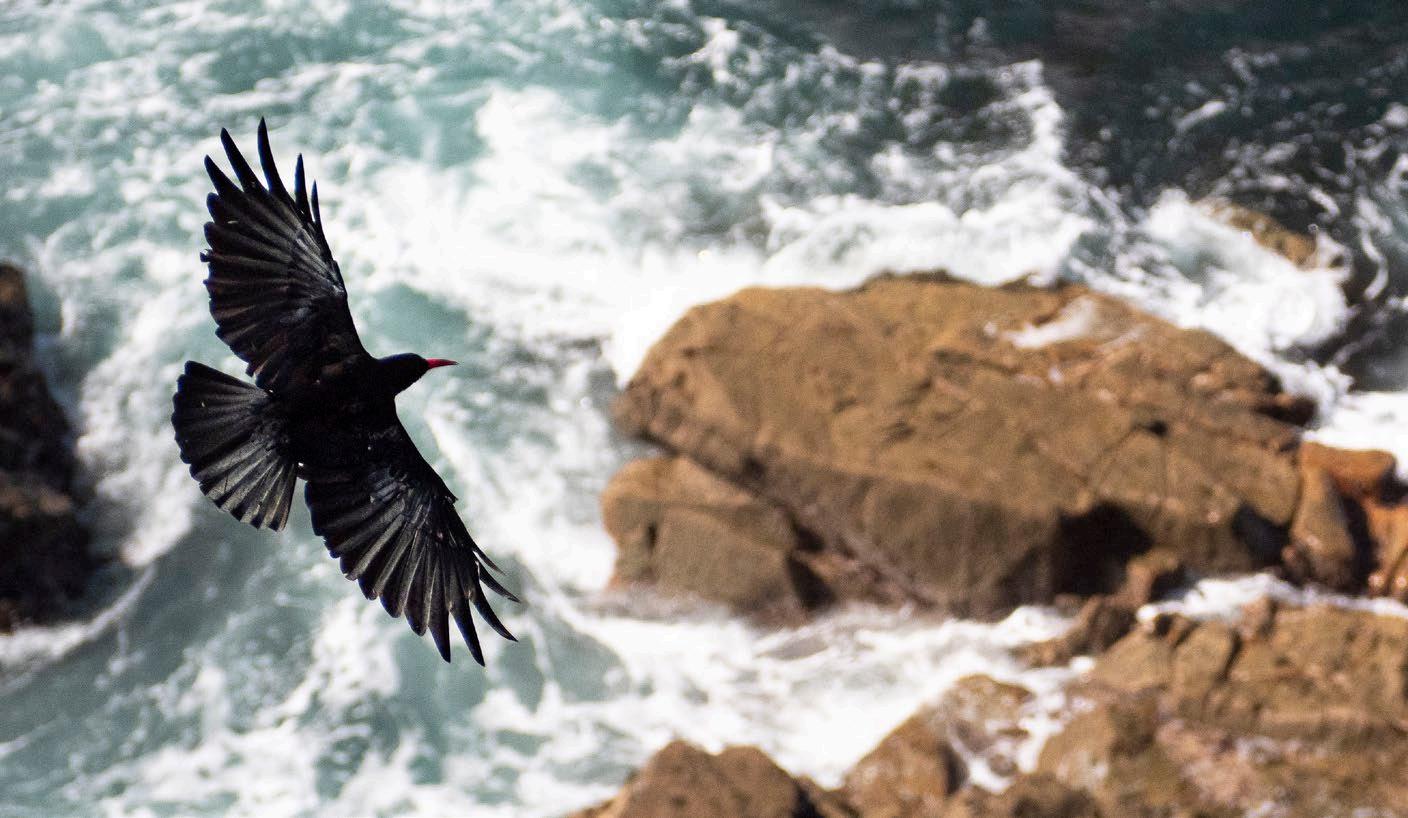
Response to Covid-19 Pandemic
The Covid-19 pandemic dominated 2020 with tragic loss of life and disruption to all our daily lives. The Board of Trustees and Association’s team reviewed the pandemic as it unfolded over the year, both in terms of impact on the operations of the charity and wider implications for the SW Coast Path National Trail and those who rely on the trail for their livelihoods. In February the coronavirus outbreak started to be reported outside China and we started to monitor, review and discuss the risks and options and set out international travel guidance. By early March discussions had started on the potential wider impact of the virus on the charity’s work and issued guidance on measures if the virus broke out more widely. The team made the decision to move to homeworking on 16th March in advance of the first national lockdown. The charity’s IT systems are cloud based and the team was able to transition to homeworking quickly which allowed us to focus on communicating rapidly changing advice on accessing the Coast Path and wider countryside as restrictions were introduced, relaxed and re-introduced. Trustees also benefited from this technology as meetings moved online. In April the Finance Committee reviewed the 2020 Business Plan and proposed a revised budget to be adopted by the Board of Trustees in May. The revised budget recognised the uncertainties in both income generation and the ability to deliver projects on the ground – as such, both income and expenditure forecasts were revised downwards. The Finance Committee and Board of Trustees reviewed the financial sustainability of the charity to ensure we met our reserves policy benchmarks throughout the year and confirmed that we could operate as a going concern. Monthly financial reports were made available to Trustees in addition to the normal quarterly reporting to ensure ongoing monitoring of the situation as the pandemic unfolded. Trustees ensured regular oversight of the risks to the charity during the year, reviewing and updating the Risk Register in addition to financial review. Our Area and Path Representative volunteers – the charity’s eyes and ears on the ground – were affected by restrictions, being able to

Visualisation of the COVID-19 virus
survey the Trail only when living local to their stretch of Coast Path during lock down. Restricted access to public transport also reduced the ability of some volunteers to access and survey the Path. The impact on the wider SWCP Trails Partnership was more visible, with a significant number of partner staff furloughed and others unable to work on the Coast Path due to restrictions. This initially impacted seasonal vegetation cutting along the Coast Path and slowed several significant capital works planned along the Trail. These delays will mean that some of the match funding for path projects allocated by the charity’s Path Committee will be accrued to be spent in the following financial year.
Many tourism and hospitality businesses were closed for significant periods of the year and worked under restricted measures when able to open. In addition, many visitor services were closed for part or most of the year including ferry services, public toilets and car parks – all impacting on people wanting to access and use the Coast Path. Tourism businesses were also impacted by the loss of the inbound international market. However, there was a significant upturn in the domestic tourism market once restrictions started to ease, giving welcome support to some part of the visitor economy. It was clear to the charity that the SWCP visitor economy would be significantly affected by the virus control measures. As such, we took the opportunity to review and update our Business Membership programme, pivoting it around into a new Way Maker scheme – helping recognise the importance of tourism businesses – accommodation, food and drink, activities and attractions - as part of the wider experience of the Coast Path. In the short-term this helped the charity support one of the most adversely impacted sectors during the pandemic. In the longer-term we hope this will improve engagement with the sector and build support for the Coast Path.
THE UNCERTAIN FUNDRAISING ENVIRONMENT WAS A CONCERN FOR THE CHARITY. HOWEVER, IN MAY THE TEAM JOINED THE NATIONAL 2.6 CHALLENGE (CREATED IN RESPONSE TO THE CANCELLING OF THE LONDON MARATHON) AND WITH A VERY SHORT TURNAROUND CREATED A CAMPAIGN TO SHOW THE IMPORTANCE OF THE COAST PATH AS A WAY OF RECONNECTING WITH NATURE DURING LOCKDOWN. THE SUCCESS OF THE 2.6 CHALLENGE WAS FOLLOWED BY THE LAUNCH OF OUR EVERY MILE MATTERS CAMPAIGN, HELPING ARTICULATE THE CHARITY’S CAUSE.
It is clear that the pandemic and associated virus control measures will continue into 2021 and wider impacts to society and the economy even longer. The Board of Trustees reviewed the Business Plan for 2021 in the second half of 2020, setting out how the charity will build capacity in 2021 to increase our resilience to these impacts and the other external risks, not least climate change. The revised Business Plan also reflects our ambitions to increase the equity of access post-covid and ensure the National Trail is used to help with the path to recovery.
Autumn sky over Perranporth in November 2020. Photo by Christopher Page

Main Activities Undertaken to Further the Charity’s Purposes for Public Benefit
Enhancement of the Coast Path Experience
A storm hitting Porthleven, West Cornwall. Photo by Scott Fisher
Covid Impact
The integrity and maintenance of the Coast Path was impacted by virus control measures with staff furloughed; contractors unable to undertake the normal spring maintenance cuts; and major improvement works delayed. Demand for the National Trail was also high, initially with locals finding escape and exercise along the Rights of Way network and then as domestic travel restrictions relaxed, with people looking to holiday within the UK. Issues around the impact of people in the countryside and along the coast when many services such as car parks and public toilets were still shut were reported, as was an increase in wild camping as formal sites had to restrict numbers to operate in a covid-safe environment. The Area Liaison meetings between our volunteers and partner rangers and Rights of Way officers were postponed in Spring and held virtually in September. The coronavirus restrictions meant that it was not possible for the annual survey of the Path to be undertaken by the Association’s Area and Local Reps in the normal way (see below).
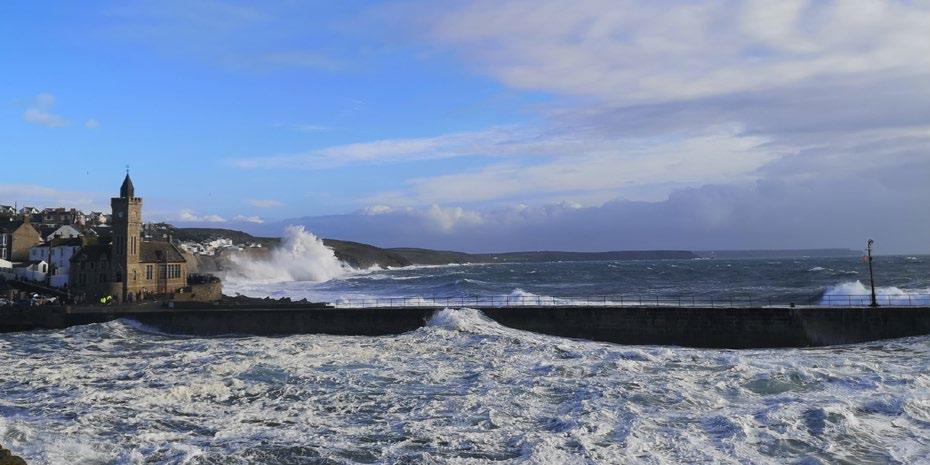
Rural Development Programme for England Projects
The final of four SWCP Rural Development Programme for England (RDPE) bids was approved at the end of 2019, funding 47 improvement projects across four Local Enterprise Partnership submissions (National Trust in Heart of the South West and Cornwall; Cornwall Council and Dorset Council in Cornwall and Dorset respectively). Investment across the projects totals approximately £750k, with the Rural Payments Agency investing £500k, Trail Partners £150k and SWCPA match-funding of £100k. All projects were planned to be completed by end of 2020. However, poor winter weather slowed delivery followed by
lock-down restrictions and wider impacts on supply lines and ability to work on the ground. Some partners also furloughed significant numbers of staff resulting in most countryside access work stopping, pushing back completion for the combined projects to May 2021. As part of the Association’s support underpinning the RDPE projects, the South West Research Company undertook an analysis of the impact of the SWCP on the local economy based on the latest Visit England data with the report to be published in 2020. Around £16k was invested in four new people counters to help monitor use of the Coast Path (adding to the three previously installed by Natural England).
Tamara Landscape Partnership
The Tamara project initial scoping report on extending the Tamara Discovery Trail to both North and South coasts was completed at the beginning of the year. When combined with the SWCP the new trail would make a circuit of Cornwall. These works are part of a wider £2.3 million project bid to Heritage Lottery Fund coordinated by the Tamar Valley AONB unit, with the outcome of the bid expected in 2021.
Path Committee Projects
In addition to the RDPE and Tamara projects, the Path Committee supported several improvement projects along the Coast path that were completed in 2020, including: • £2.4k invested for National
Trust works to create a new alignment following a cliff fall at Tinsey Head, South
Devon - subsequently funded by Totnes Ramblers • £7k for path resurfacing in
Dorset at Bincleaves Green (Weymouth) and Ringstead (Osmington) • £1.2k for restoring stone steps at Grove Cliff,
Portland • £5k towards a new granite footbridge and steps at
Kynance Cove through a memorial donation • £2.3k towards a new oak footbridge near
Abbotsbury • £4k for path widening at
West Bay where previous width had been significantly reduced due to a cliff fall • £3.5k for step boards through the Step Up
Appeal across Cornwall and Devon • £3.6k for waymarkers and fingerposts across Exmoor,
Devon and Cornwall • £3.4k to Dorset Council for maintenance work (using income from 2019 Coast
Path Friendly Events)
Funded improvement projects underway but with completion due in 2021, include creating a new path alignment between Lyme Regis and Charmouth, reinstating an off-road section of path at Blackpool Sands, and improving gradient, surfacing and gateways near Branscombe. The Path Committee has allocated more than £23k towards these planned works.
Climate Change
The climate crisis continues to be at the forefront of our thinking, with the Path susceptible to the impacts of more frequent and stronger storms. Six named storms hit UK shores in 2020, with cliff falls and landslips requiring path closures and diversions. Examples included at Osmington, Dorset and between Duporth and
Charlestown, Cornwall in March; and at Highlands End, Dorset in November. The charity and wider Trail Partnership are working to develop a strategic response to the climate crisis for the Coast Path for the November 2021 United Nations Climate Change Conference, COP 26.
Path Survey and Condition Report
Association Area and Local Path Representatives (all volunteers) undertook a condition survey along the Coast Path in the Autumn and Winter of 2019/20, following the same methodology of previous surveys, measuring against National Trail Quality Standards. The results of this are summarised in the table below. The value of volunteers undertaking this work often surveying in poor conditions through the winter is greatly appreciated by the Association. The ability to undertake surveys in 2020/21 (to be reported next year) was impacted by covid restrictions with some of the volunteers being able to access their allocated stretch of the National Trail. During lockdown surveyors were advised to only undertake survey work if they could access their length of the Path on foot from home, and then only if they felt comfortable doing so and ensuring that national guidelines were followed. The condition survey shows that the condition of the countryside furniture along the Path (gates, stiles, steps and fencing) and the signposts and waymarks, has continued to decline from the peak condition of 2012, but is not significantly different when compared with the previous four years despite cuts in the core maintenance grant. This continues to reflect the significant extra investment in the Trail through the work of the Association and Trail Partnership and specifically the impact of targeted campaigns such as Step Up Appeal and Find Your Way appeals.
Chart 1. The percentage of Coast Path infrastructure meeting National Trail Quality Standards 2001 to 2020 100
80
60
40
Furniture
Signs All infrastructure
2001 2005 2009 2012 2016 2017 2018 2019 2020
Path Completers
Completer numbers have dropped for both members and non-members on previous years, understandably due to the Covid-19 restrictions. Completing all 630 miles of the South West Coast Path is an incredible achievement, however, we also know that completing any part of the Path can be a massive accomplishment, and one that deserves recognition. This is why we have not only redesigned our completion certificates, but also added further path section certificates as well including Somerset and Exmoor, North Devon, North Cornwall, West Cornwall, South Cornwall, South Devon, East Devon and Dorset so members and non-members can celebrate their personal goals.
Improving Equity of Access
Working within coronavirus restrictions we continued to deliver our pilot Connecting Actively to Nature (CAN) programme in Torbay and North Devon (Nordic walking) and started an additional project in Ilfracombe which will be completed in 2021. In these projects, we engaged with over 90 people aged over 55 with the aim of getting them more active and exploring the Coast Path. We had some great support from our Local Reps in this work, and a new Path Rep was recruited after volunteering with our project in Torbay. All projects were restricted by number of participants due to virus safety measures.
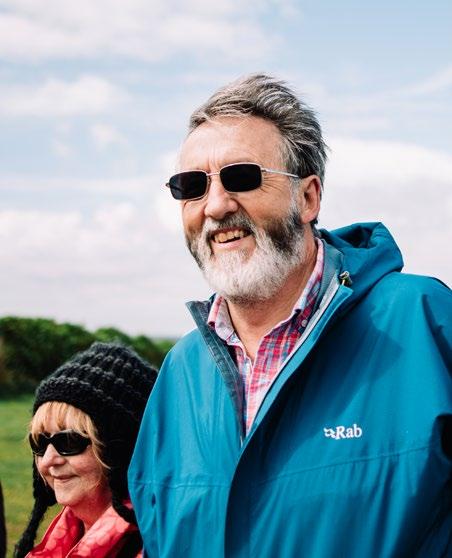
CAN walk taking place in Plymouth. Photo by Liberty Pearl Photography
Table 2. Walkers of the Coast Path requesting a completers certificate 2016 to 2020
Completers 2016 2017 2018 2019 2020 Members 90 97 91 101 73 Non members 75 95 150 151* 112
* In the 2019 Trustees Report non-member completers was incorrectly reported as 235
In July 2020, we led two guided walks engaging with a total of 12 young people (aged 10-20) in North Devon with the Wave Rangers project and hope to continue this relationship in 2021. Again, this project had reduced numbers due to restrictions. In Autumn 2020, we started work on our Accessibility information and held a day’s walk with members of Disabled Ramblers at Berry Head in South Devon. This work will inform changes to the website and walk information, as well as Path improvements and is being further developed in 2021. We also led five photowalks with Devon and Cornwall Refugee Support and Fotonow. These were partially funded by the International Sports and Cultural Association’s Move Beyond project and engaged with 10 refugees and exploring the Coast Path in and round Plymouth. These were paused in the November lockdown and will be restarting in 2021. In August 2020, we again supported Planet Earth Games, providing one of the programme’s daily personal challenges - a photography challenge which received over 150 entries. The Wembury Rubbings Trail was up for its last year in 2020. Despite limited places of outlay for the leaflets due to the closure of Wembury Marine Centre and NT carpark information point, we still had uptake and it was a good opportunity to maintain relationships with local businesses such as Churchwood Valley Holidays, and the Old Mill Café. Education resources are still available on our website, including a new craft page linked into the Inspired by the Coast project and a Home Learning Pack created during the first coronavirus lockdown.
Leading a walk with Devon and Cornwall Refugee Support. Photo by Fotonow
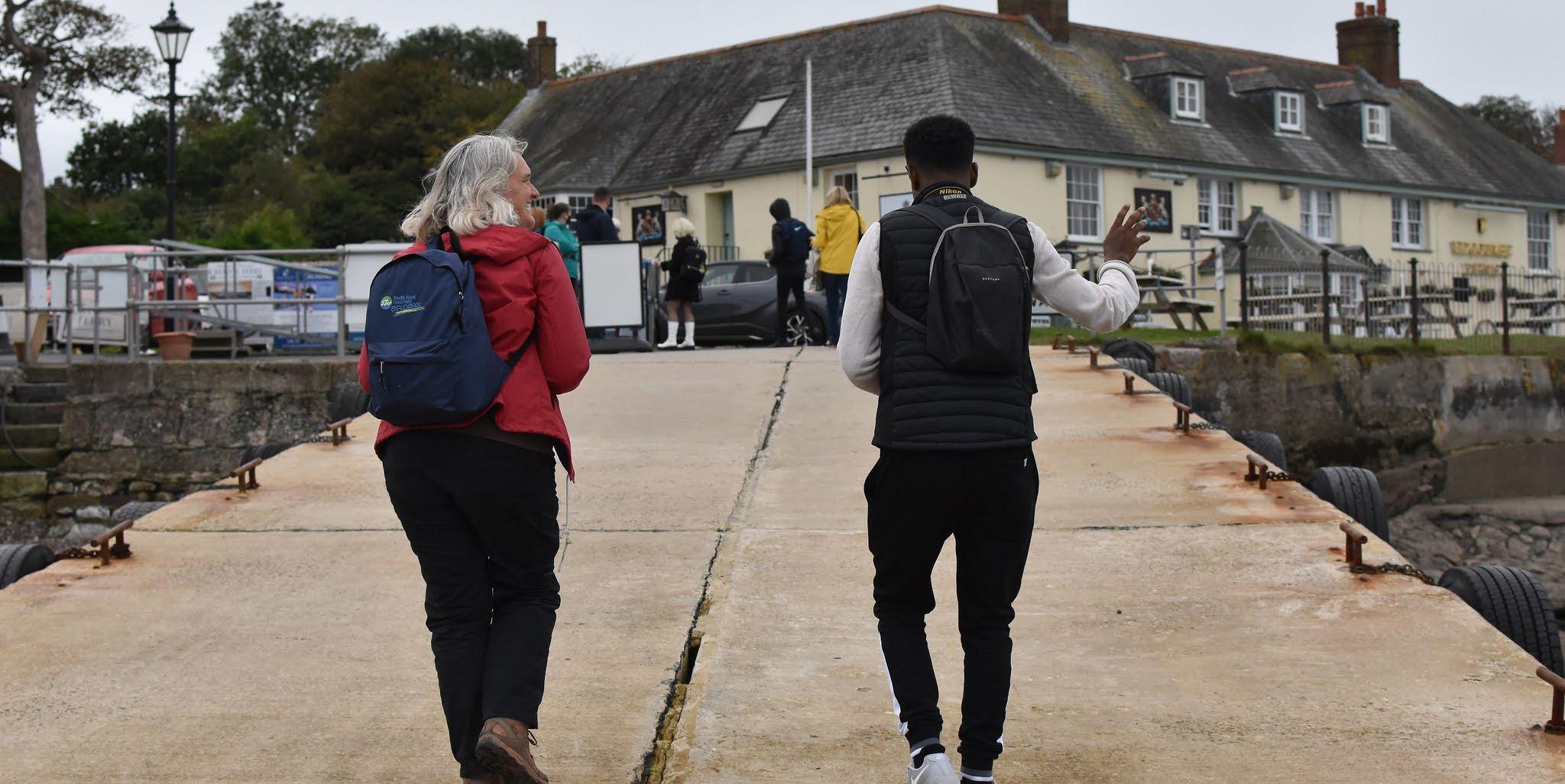
Health and Wellbeing Working Group
A new Trustee Working Group was set up over the year to more formally recognise and co-ordinate the charity’s work and impact across health and wellbeing. Research on the economic impact of the health benefits of walking the Coast Path was commissioned with the University of Exeter Centre of Policy Research to be published in 2021. The pandemic has shone a spotlight on the mental health benefits of being outdoors and reconnecting with nature – and being a safe space to engage with people as restrictions are eased. As such, discussions were started with the mental health sector to identify synergies and develop partnerships.
South West Coast Path Trail Partnership
The Trail Partnership oversees the management, maintenance, improvement, and promotion of the South West Coast Path National Trail for the benefit of the public. It champions the protection, enhancement and access to the landscape, biodiversity and cultural heritage of the Coast Path corridor. The Delivery Group comprises six Highway Authorities (Cornwall and Dorset Councils, Devon County Councils, Torbay Council, Plymouth City Council and Exmoor National Park Authority), the National Trust, Natural England (NE) and the SWCP Association with an independent Chair. As set out in A New Deal for National Trails, Natural England provides an annual grant towards the SWCP Trail Partnership to help maintain the Coast Path to the higher quality National Trail standards. This grant funds a maximum of 75% of the day-to-day maintenance of the National Trail, paid directly to the Highways Authorities, who with National Trust fund the remaining 25%. The 2020/21 NE grant settlement was £441k – the same as the previous year’s grant. The grant allocation is set out in a Delivery Framework and based on percentage of path within each jurisdiction.
Table 3. Percentage allocation of Natural England grant allocated towards maintenance by Highway Authority area
Highway Proportion of Authority grant
Cornwall 48.4% Devon 30.1% Dorset 11.9% Exmoor 4.8% Plymouth 1.0% Torbay 3.8%
A proportion of the NE grant is used to fund regional co-ordination work on behalf of the Partnership by the National Trail team including the National Trail Officer and is managed by the Association. The SWCP Trails Partnership met twice over 2020 with mitigation of impacts of Covid-19 and associated restrictions being a major focus of discussion.
Trail Partnership Project
Over the past five years, the Highways Authorities, National Trust and Association have invested in a SWCP Trails Partnership project (TPP). The TPP has helped build capacity of the charity; leveraged £2 million extra investment in the Coast Path; and helped protect the grant for the family of National Trails across England and Wales including the SWCP. In recognition of the success of this project the Trails Partnership Delivery Group partners agreed an extension of a further three years to the Trails Partnership Project, committing £150k over the next three years.
Table 4. Annual breakdown of investment into the Trail Partnership Project by the SWCP Trails Partnership
Trail Partnership Project investment 2020/21
Cornwall Council
Devon County Council Dorset Council
Exmoor National Park Authority National Trust
Plymouth City Council South West Coast Path Association
Torbay Council
Total
£9,248 £5,688
£3,087 £1,036
£15,000
£320
£15,000 £621
£50,000
Planning Working Group
The Association’s four volunteer planning advisors, one each for Exmoor/North Devon, Cornwall, South Devon and Dorset, continue to advise the Association and to respond to the relevant Planning Authorities on our behalf on planning matters with a potential impact on the Coast Path. During 2020 the Association made representations on seven planning applications which would have had an adverse impact on the Path. In addition, a number of other applications, and one major environmental improvement proposal, were looked at following requests from Association members and members of the public but, following consideration, were not pursued. Notification of relevant planning applications along the Trail remains an outstanding issue with only a few relevant Planning Authorities informing the Association of potential issues. For most of the route we rely on local volunteers to notify us of proposals. During the year a paper setting out detailed guidance to our Area and Local Reps on notifying our planning advisors of relevant proposals was re-issued. In addition, initial discussions are under way with the South West Protected Landscapes Group, a body which represents the region’s AONBs and National Parks, to see if notification through these authorities is possible, since generally they do receive notification, and the majority of the Trail falls within one of these designations. Association responses have been made to the Cornwall AONB Management Plan consultation, and to the new Dorset unitary authority Local Plan. Consideration was given to making an Association response to the Government’s Planning White Paper, which is proposing major changes to the planning system which could have repercussions on the Trail in some places. Given the very high number of largely critical responses made from a wide range of bodies and individuals, and the similarly critical response of many backbench Government members, including local ones, advice was that no action on this was likely to be forthcoming soon and we would be better to hold our fire for the present.
England Coast Path
Natural England continue to co-ordinate the designation of the England Coast Path (ECP) National Trail with the aim of adding 2,000 miles to the National Trails network, connecting to many more communities. In January proposals were published for the stretches covering Combe Martin to Marsland Mouth and Cremyll to Kingswear for comment, with only one section (Lulworth Ranges) now outstanding. In Barnstaple the Association is looking for the SWCP and ECP routes to diverge with the original SWCP route remaining over the old bridge and the ECP following the legislation’s first estuarycrossing rule over the new bridge (similar to the approach at Plymouth with the SWCP continuing up the estuary and the ECP taking the first crossing).
AS THE PANDEMIC UNFOLDED PREVIOUS DELAYS TO DESIGNATION WERE COMPOUNDED BY THE VIRUS CONTROL MEASURES AND THE DESIGNATION PROCESS SLOWED WITH THE COMPLETION DATE BEING PUT BACK FURTHER.
Signage in Minehead showing the SWCP as part of the England Coast Path In July a report was published for comments that modifies the proposals for Hurlstone Point and Glenthorne, Exmoor, (part of the Minehead to Combe Martin stretch). Establishment works for improvements or new parts of the route can be undertaken once sections are approved by the Secretary of State for Environment, Food and Rural Affairs. Natural England confirmed funding for ECP establishment works (the England Coast Path Establishment Fund) are still identified via the Rural Development Programme for England (RDPE) and the UK Government has guaranteed that any RDPE projects where funding has been agreed before September 2021 will be funded for their full lifetime. As such, this should mean any works needed to improve the ECP route in the South West are protected. South Devon estuaries remain an unresolved issue with the alternative route around the Yealm not ideal as it runs mainly on roads. The Avon crossing uses Avon Valley Trail which is a better solution as an alternative route. However, the ECP route across the Erme estuary still relies on the wading route which is not accessible much of the time and no alternative route available. The Association see this as a major limitation to the idea of a continuous route and is of concern. As such we requested that NE look further at the potential for resolving access across the Erme and finding an alternative route linking Noss Mayo and Bigbury. To help showcase these issues the Association published an ECP Estuary Policy. Considering the delays to the ECP designation Visit England’s Year of the Coast campaign was pushed back from 2021 to 2023, which coincides with the 50th anniversary of the Association. This campaign’s focus is celebration of the coast with the designation of the Coast Path being a significant moment to celebrate.
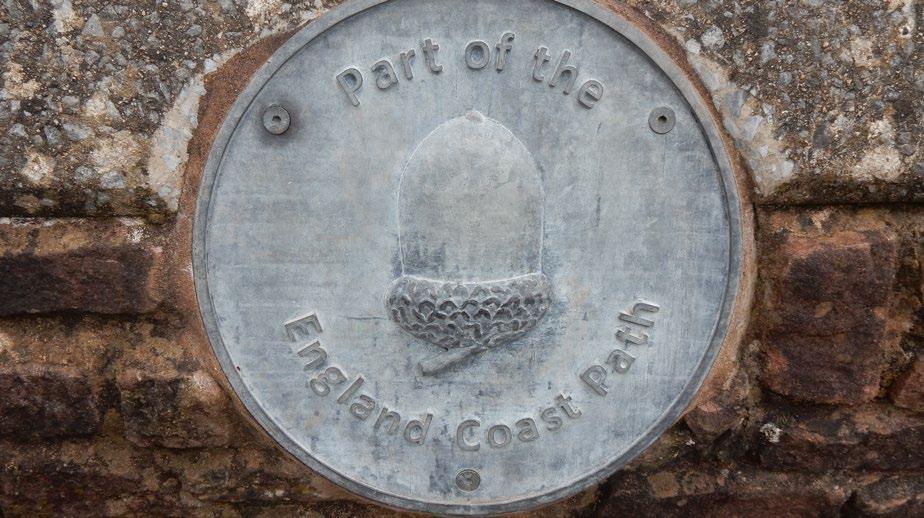
National Trails Alliance
The Association continued to work with the wider family of National Trails better to co-ordinate activity across the Trail Partnerships. The Funding Working Group liaised with Natural England and Defra to secure a settlement for 2021/22 at the same rate as 2020/21. This is a one-year settlement as the government’s Comprehensive Spending Review (CSR) did not take place again. The National Trails have been recognised as part of the National Landscapes family and are have asked for parity, in terms of funding security, with National Parks and Areas of Outstanding Natural Beauty in future funding rounds. The National Trails Alliance Working Group continued to seek funding to push forward the development of a charity for the Trails. A HLF Expression of Interest submitted in 2019 was put on hold with the onset of the pandemic. A revised bid was developed in response to the announcement of the Green Recovery Fund - the fund was 10x oversubscribed and the bid failed. However, the match-funding raised for this bid will be used in 2021 to appoint a development manager to take the project forward. Over the year the Working Group coordinated a repose to the 2019 Government’s Review of Protected Landscapes and developed a Vision for the Alliance, setting out how National Trails can deliver important parts of the Government’s 25 Year Environment Plan and the public benefit the Trails Partnerships help deliver.
World Trails Network
The Association continued its involvement with the World Trails Network (WTN) including reviewing the WTNCovid-19 Trails Guidelines and being part of the Task Team developing a Trails and Sustainability White Paper.
Finger post en route to Golden Cap, Dorset. Photo by Gary Holpin
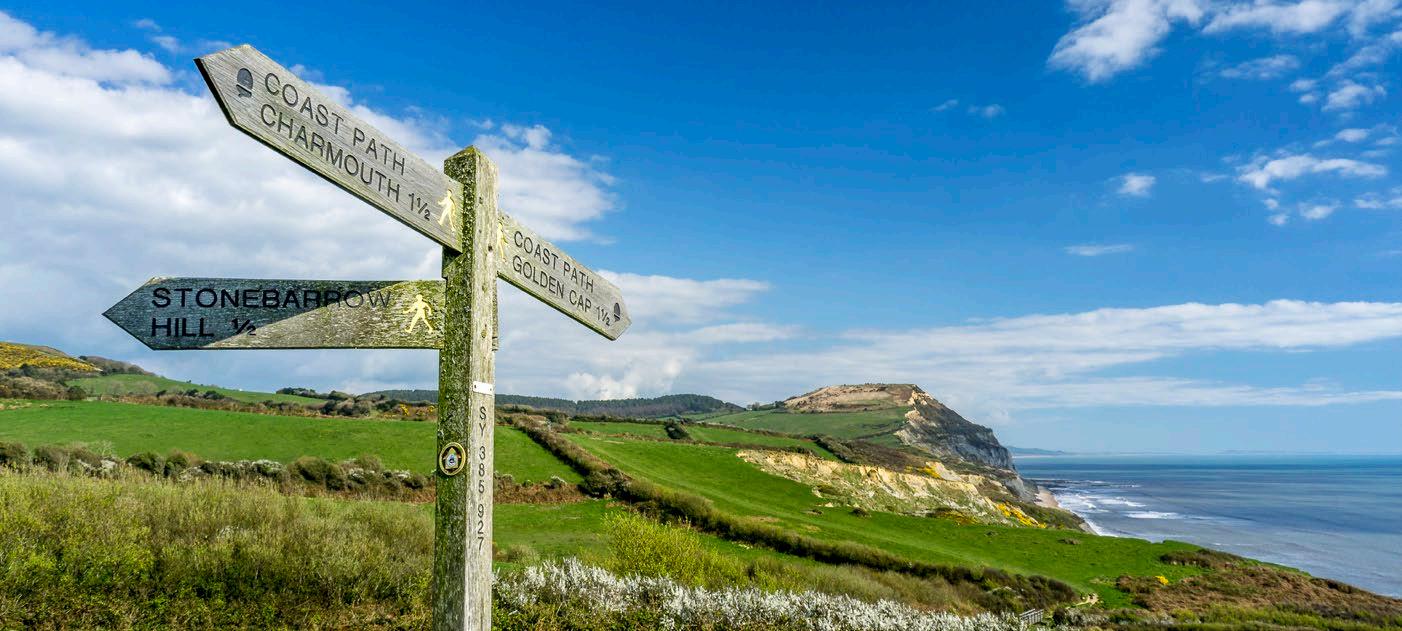
Fundraising to support the Coast Path
Trusts and Grants
We received just under £215k in funding from Trusts and Grants in 2020, which accounted for around 40% of our income for the year and £46k increase on 2019. A total of £36k was given to the charity as unrestricted funds for core costs, including a Plymouth City Council Covid-19 Business Discretionary Grant. All the remaining funds were restricted or designated to specific projects, specifically: £86k to the National Trails Team; £35k to the Trails Partnership Project; £6.5k for Connecting Actively with Nature – Couch to Coast programme and youth outreach; £10k to Coast Path improvement projects; and £3k to the Way Makers appeal. Natural England gave a grant of £60k towards the National Trails Alliance project. This is managed by the Association on behalf of the wider family of National Trails Partnerships. £37k was spent in 2020 and the remaining grant will be spent by 31 March 2021.
Table 5. List of reportable Trusts and Grants received by the Charity during 2020
Trusts
Gibbons Family Trust 29th May Charitable Trust John Coates Charitable Trust Viscount Amory’s Charitable Trust Elmgrant Trust SMB Charitable Trust
Garfield Weston Foundation
Norman Family Charitable Trust
Grants
Active Devon
Sparc Sport Devon County Council Natural England Rural Payments Agency Plymouth City Council SWCP Trail Partnership Project £250
£5,000
£5,000
£500
£1,750
£1,000
£25,000
£1,000
£5,620 £625 £86,443 £37,447 £113
£10,000
£35,000
Association Membership
We received around £115k from Membership in 2020, accounting for around 20% of the year’s income and an increase of 6% on 2019.
Table 6. Membership income 2015 to 2020
Membership Income 2016 2017 2018 2019 2020
Memberships £76,384 £94,664 £96,267 £108,167 £114,660
Table 7. Number of members of the Association 2018 to 2020
Number of Members
Joint Individual
Total 2018
6,892
3,241
10,113
2019
7,096
3,354
10,450
2020
7,114 3,386
10,500
The number of members of the Association grew slightly over the year from 10,450 to 10,500. It was heartening to see Membership of the Association hold up during these uncertain times. £10 from each membership1 is put into a Path Fund for work along the Trail. Business Membership was quickly identified as an area of work threatened by the virus control measures with many tourism businesses closed in the first lockdown. The Association took this threat as an opportunity to review and pivot business membership, moving it away from a transactional marketing model (which was always seen as a better fit with a Destination Marketing Organisation than a health and wellbeing charity). A new Way Makers programme was developed and launched in the third quarter of 2020 with the aim of showing our support for a beleaguered sector and better articulating the strong relationship between the businesses along the Coast Path and the experience of walking the Trail. Specifically, accommodation, the food and drink along the trail and the many attractions and activities along the coast of the South West, and most importantly the warm welcoming people who run these businesses and help walkers with their journey. The programme was launched to ensure businesses entering the scheme could be listed in the Association’s 2021 Complete Guide to the SW Coast Path. This repositioning of our relationship with tourism businesses should build into a stronger and synergistic partnership which will help with the long-term sustainability of the National Trail and the businesses that rely on it.
Donations
Despite the uncertain fundraising environment in 2020 Individual donations, gift aid and legacies amounted to over £100k income for the charity, just under 20% of total income. Of particular note was a 200% increase in individual donations over £100 and doubling of community fundraising from 2019. This can be put down to the success of the 2.6 Challenge - which is the first time the charity has run such an emergency campaign and introduced our cause to a whole new audience of community fundraisers – and subsequent Every Mile Matters Campaign, again helping articulate the charity’s cause. The team actively engaged and fundraised through the 2.6 challenge which helped raise awareness of the opportunities and pitfalls of community fundraising, and showed we were happy to roll up our sleeves and get involved in actively fundraising for the Coast Path. The launch of the Every Mile Matters campaign helped with individual giving as it included a new Mile Maker allowing individuals to support the costs of maintaining the Coast Path along an average one mile stretch. Over £30k was received though Gift Aid over the year. We received around £16k in legacy income, but this was dwarfed by a significant legacy in 2019. The Find Your Way appeal was strong again in 2020. We didn’t promote the Step-Up appeal as much this year as we had just under £12k restricted for steps carried over from 2019.
Self-assemble cardboard donation box provided to fundraisers
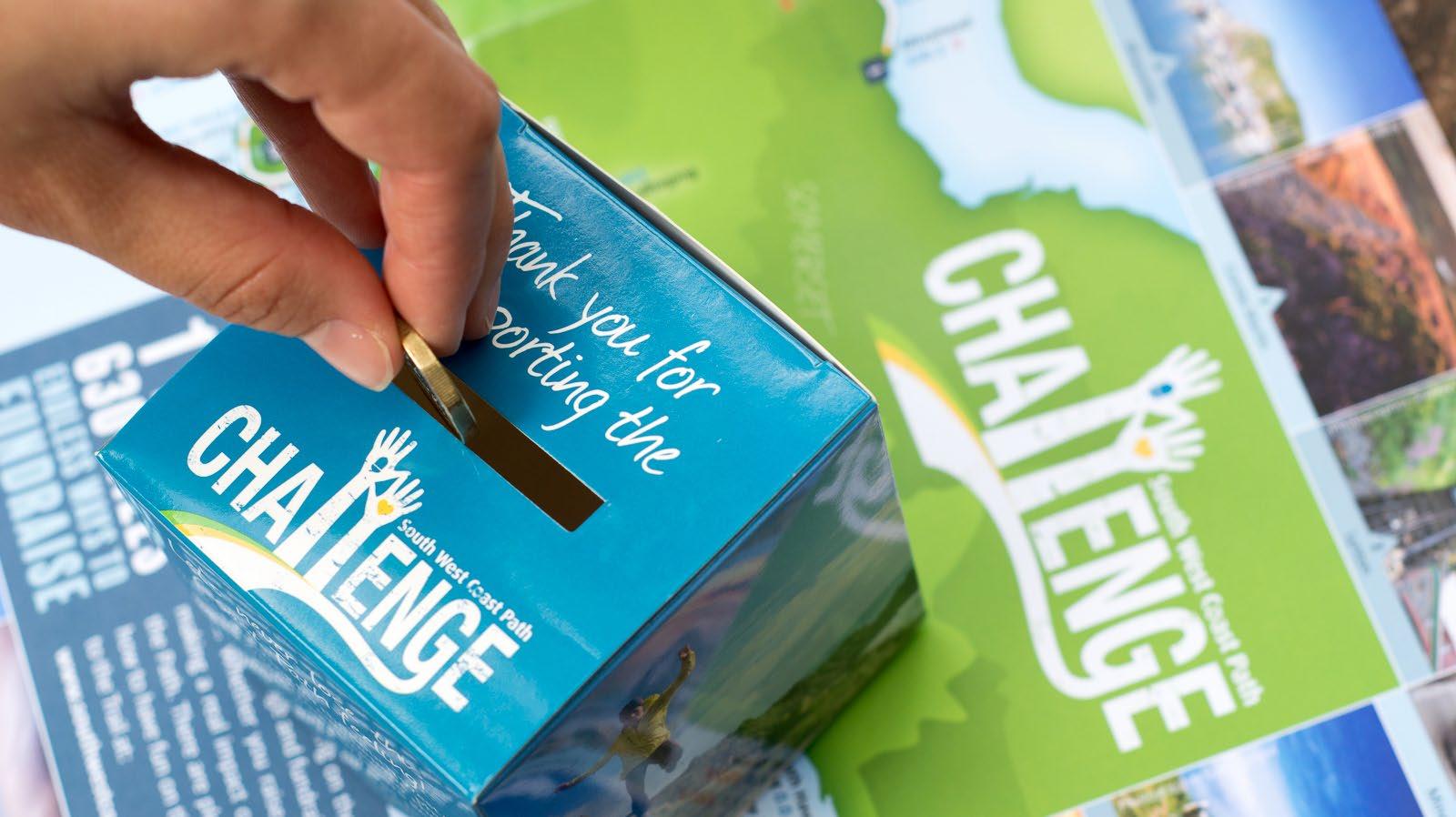
Corporate Engagement
With the uncertainties in the business sector from the pandemic we transitioned the charity’s corporate sponsorship offering to be held under the umbrella of our Every Mile Matters Campaign. South West Water became the lead sponsor of the campaign and SW Business Council and Forthglade took up supporting sponsor offers, generating over £22k. This benefits the charity in that we can deliver our campaigns with business support rather than sponsors requiring their ‘own’ bespoke campaigns. Sponsors also benefit as they can chose which part of the Every Mile Matters campaign is the best fit for their business Corporate donations and fundraising donations were down on 2019. This reflects a difficult business environment and a shift in businesses giving in-kind support to the charity rather than cash. The combined income from Way Makers and corporate donations and sponsorship was approximately £52k in 2020 - a 24% drop from 2019. As a result, and capitalising on the nation’s newfound interest in walking and staycations during the pandemic, our corporate leads list has grown significantly with brands actively seeking out the charity to discuss opportunities. This corporate interest was given a boost in August when we were accepted as a not-for-profit partner of the global environmental fundraising platform: 1% for the Planet. Our challenge will be to convert this interest into financial support for the Coast Path over the next years.
OVER THE YEAR WE MAINTAINED A STRONG SOCIAL MEDIA PRESENCE TO HELP INFORM PEOPLE OF THE EVER-CHANGING ADVICE AND GUIDANCE ABOUT WHAT PEOPLE COULD DO WHERE, WHEN, AND HOW… ALONG THE COAST PATH.
South West Water became lead sponsors for the Every Mile Matters campaign
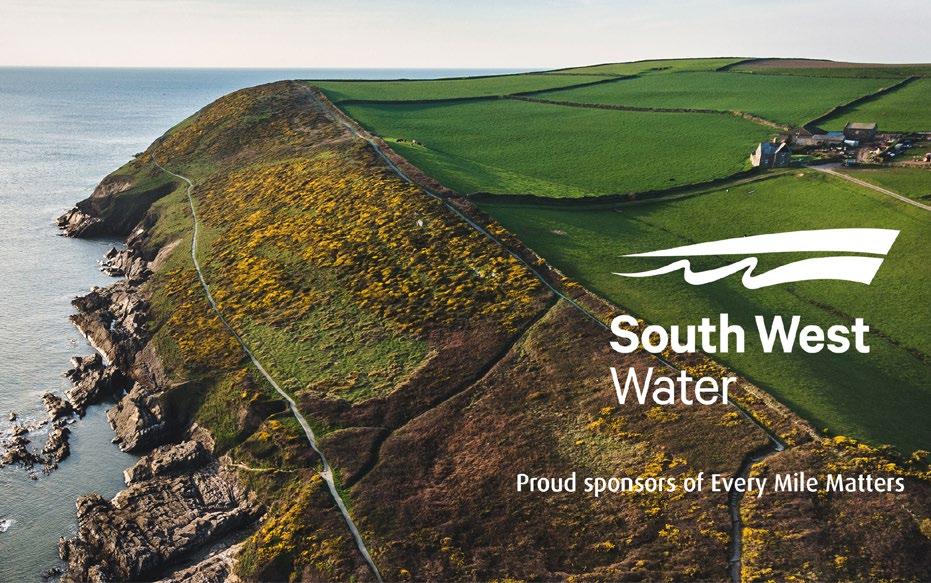
Coast Path Friendly Events and Annual Golf Fundraiser
Launched in February 2019, we had high hopes for a growth year for Coast Path Friendly Events in 2020, with a number of event organisations reaching out to be part of the scheme. However, lockdown and subsequent restrictions have put the programme on hold until restrictions are lifted sufficiently to host largeparticipant events again. Similarly, our Annual Golf Fundraiser at Thurlestone Golf Club was cancelled for the first time in seven years. However, just under £2k was raised from Coast Path Friendly Events in 2020 to go towards path maintenance in 2021.
Marketing and Communications
The transition and strengthening of the Association’s brand continued over 2020. A significant focus over the year was to ensure members and wider users of the Coast Path had access to accurate and timely information about access to and along the 630 mile long National Trail in line with government guidance. Over the year we also communicated about a diverse range of topics achieving more media coverage than ever before including health and wellbeing, climate change and fundraising. Trailblazing remained our flagship member publication with an online version developed for international members over the year. The 2020/21 Complete Guide was launched in January with an introduction from Salt Path author Raynor Winn. Over the year the Guide was updated including the inclusion of the new Way Maker businesses and 2021/22 edition printed in December. Our annual Photo competition was successfully held Further work was undertaken to update the charity’s web site, including a much-needed upgrade to make the site mobile-responsive to ensure we support the growing number of users accessing our information from tablets and smart phones. Content on the web site was constantly updated over the year with a dedicated landing page for Covid -19 advice. A new campaign was launched over the year to highlight people in the creative industry who have been Inspired by the Coast and showcase their work at a time when many galleries and performance spaces were shut. In addition, the 2.6 and Every Mile Matters campaigns were marketed and managed through the web site, along with the new Way Maker programme – all bringing us more up-to-date as an organisation and enabling the charity to reach and engage with broader audiences. A Coast Path and You survey was undertaken to gain better market intelligence and understand users of the National Trail, with over 1,000 respondents.
Social Media and e-Communications
Throughout 2020 we issued two eNews every month to members and wider supporters, along with quarterly updates to our Way Makers. Social media engagement continued to grow over the year with Facebook followers increasing by 36%, Twitter 4% and Instagram by 65%, reaching a combined audience of over 65k. Continuing the success of 2019 our Instagram growth continues and we now have over 22k followers. Our messaging across each of the platforms has a different tone and audience and a new LinkedIn presence was created this year for corporate messaging. In addition to these online channels, we have continued to improve our eNews and have increased our mailing lists circulation by 5%. Our Member eNews has a 60% open rate and our wider supporter eNews 40% - both significantly higher than the national average of 16%. Taking mailing lists into consideration along with social media audiences, we are now talking to a combined audience of 72k. Video was also used effectively over the year with the commissioning of two health and wellbeing videos and a live-streaming event over YouTube, Twitter and Facebook – with over 5k views over the event.
Social media audience growth across Facebook, Twitter, Instagram and LinkedIn

In the News
Over 2020 the South West Coast Path featured across a broad range of publications locally, regionally, and nationally. As the SW generally and Cornwall specifically had lockdown tier restrictions, many media organisations filmed programmes which would have historically been filmed elsewhere. The result has been a significant amount of SW Coast and Coast Path exposure via broadcast media. When lockdown eased the Coast Path featured across many national papers and web news sites with crowds at Durdle Door being used as an example of people flocking to the coast and countryside after being locked up in cities for months. The charity supported many media enquiries, helping connect media producers with relevant local contacts. In addition, the Association published several press releases over the year and undertook subsequent media interviews and broadcasts. When lockdown eased, an opportunity opened for attempts at the FKT (fastest know time) for the Coast Path. In September, Kristian Morgan completed the 630 miles in just 10 days 12 hours and 6 minutes, shaving more than three hours off the longstanding record held by ultra-runner Damian Hall. This event alone generated over 50k social media reach and significant online, broadcast and print media coverage. Subsequently the Association has received at least 10 enquiries about FKT guidelines for new attempts.
THURSDAY, MAY 21, 2020 THE CORNISHMAN 29 ENVIRONMENT COLUMN, CO-ORdINaTEd BY THE CORNWaLL aREa OF OUTSTaNdING NaTURaL BEaUTY UNIT Every mile matters in bid to maintain path
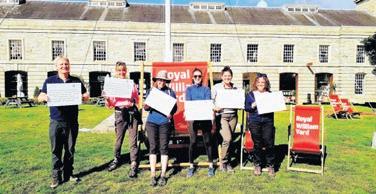
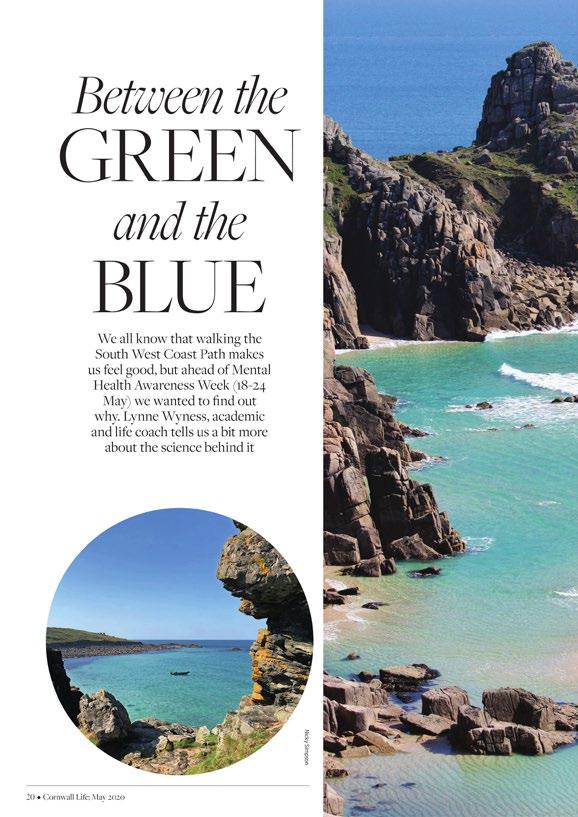
Since 2007, a small group of volunteers has systematically surveyed the wild flowers found in every one kilometre square of cornwall – that’s 3,940 squares. The result is the most comprehensive survey every undertaken in Britain and it has revealed several surprises and discoveries. The result of all this is Flora of cornwall, a 550-page, full colour, hardback book which covers 3,018 flowering plants and ferns and includes more than 1,200 distribution maps and 1,700 photographs. Two plants found in the survey were new to science. The first was a hybrid between new Zealand willowherb and small-flowered hairy willowherb. The second was the hybrid between fragrant orchid and southern marsh-orchid, which was discovered on the Lizard peninsula in 2016.A number of native plants were also found in cornwall for the first time, which the group behind the book say is a rare and special event. Species found include the service tree (Sorbus domestica), a single example of which was discovered on the bank of the camel estuary in 2013. This is one of Britain’s rarest native trees.Other discoveries included diaphanous bladder-fern (cystopteris diaphana), which was discovered as a new to Britain in 2000. it was then realised that the cornish plants were a different species, which was previously unknown in Britain. in addition nine plants which were thought to be extinct in cornwall have been rediscovered. These included blunt-flowered rush, which had not been seen since 1879. Sand crocus was found growing on the clifftop near Polruan in 1879 and 1881 and was not seen again until 2002 while perennial centaury was thought to have become extinct but was rediscovered near Porthgwarra in 2010.Remarkably no native plants are known to have become extinct in cornwall since 1982 whereas, in other parts of Britain, an average extinction rate of one species every two years has been calculated. However, the survey has shown that at least half of the native and archaeophyte plants (plants introduced before the year 1500) were more widespread before 2000 and a that minimum of 40% of cornwall has lost 90% of its flora in the past 50 years.The book can be obtained at the pre-publication price of £40 by sending a cheque, made out to colin French, to 12 Seton Gardens, Weeth Road, camborne or by emailing whealagar4@gmail.com 6The hybrid between fragrant orchid and southern marsh orchid, which was discovered, new to science, on the Lizard Peninsula. It features in a new book detailing the results of the survey which found it, called A Flora Of Cornwall In-depth survey reveals flora shocks and discoveries We have all had a lot of time recently to reflect on what matters most to us. And access to beautiful outdoor spaces is topping the list for many. Here in the South West, the coast Path provides health-giving happiness to millions of people every year, connects hundreds of coastal communities, helps the region’s economy thrive and is one of our most precious wildlife corridors. it is a vehicle for change that, if supported, could help us repair the growing disconnect between us and our environment. Yet less than 1% of people who use the path give back to it regularly and its long-term future is under threat. increasingly severe storms, rising sea levels, coastal erosion and increased footfall are just some of the challenges the charity which looks after the path is facing. And the costs of doing so, continue to soar. Over the past five years, the South West coast Path Association (SWcPA) has had to invest an extra £2 million to keep the path in good condition and yet it remains vulnerable to the damaging effects of climate change. in addition to this, the charity is facing significant funding losses due to the impact of coronavirus. Alongside thousands of other charities across the UK, the SWcPA has been responding to these funding losses in a number of ways, including taking part in emergency fundraising campaigns like the national 2.6 challenge. This challenge was born out of the postponement of the London Marathon and saw thousands of stay-at-home heroes come together to raise money for their favourite charities across the nation. coast path fans responded in their hundreds by walking, running or dancing their way towards milestones based on the numbers 2.6 or 26. Thanks to 230 supporters across the South West, the association was able to raise over £7,500. That’s enough to help look after just over five miles of the coast path for a whole year.But looking beyond the effects of coronavirus, the future presents yet more challenges for the charity and the path.Our climate is in crisis and the consequences of this can already be seen all along the South West coast, driving up the cost of keeping the trail open. The SWcPA has supported the coast path over the past 45 years but the costs to maintain, improve and protect the trail have now risen to around £1,400 per mile each year. if we can’t continue to meet this level of investment the coast path will cease to exist in the same way it does now – and the people who rely on access to it and the businesses whose livelihoods depend on it, will also be under threat.Through a new campaign called every Mile Matters, the SWcPA is aiming to raise £100,000 to help increase the path’s resilience against the onslaught of extreme weather; conserve the trail corridor’s rich biodiversity and distinct cultural heritage; support the South West tourism economy and demonstrate the real, positive impact it has on people’s health and wellbeing.To kick things off, the association wants to hear from all users about the places on the path that matter to them most and why. is it where you met your husband, first taught the kids to swim, made a life-changing decision or simply a place you feel somehow connected to? Post a picture of your special place, tagging in the South West coast Path account with the hashtag #everyMileMatters to show your support.For more information about the campaign and about ways that you can donate or fundraise visit www.southwestcoastpath.org.uk/ everymilematters The South West coast Path national Trail is Britain’s longest. Stretching 630 miles, it wraps its way around the region, creating a natural corridor through outstanding national landscapes. it boasts an extraordinarily wide variety of habitats, such as grassland, heathland, moorland, woodland, coastal cliffs and saltwater marsh, to name but a few. More than 70% of the whole South West coast Path passes through a national Park or Area of Outstanding natural Beauty (AOnB). by Becky Millington Communications officer South West Coast Path Climate change ChanCE to havE your say »The Cornwall AONB Partnership consists of 22 independent organisations, including Cornwall Council. Climate change is one of the major threats to our bee species and you can have your say on Cornwall Council’s Climate Change Development Plan which is out for public consultation until May 26. See www.cornwall.gov.uk/ media/42832008/climate-changedpd-scoping-report.pdf. This is the first scoping document, providing some initial ideas on how the planning system can address the challenges we all face with climate change. 6This stretch of the South West Coast Path has been repaired since this cliff fall, an example of the expensive work needed to keep the National Trail openNational Trust
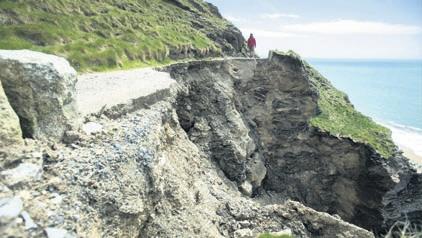
SATURDAY, JUNE 22, 2019 PLYMOUTH HERALD 21
News
Path staff in coastal challenge
FUNDRAISING HIKE OVER 14Km OF SOUTH WEST COAST PATH
By RAcHAEL ATKINS
rachael.atkins@reachplc.com @ratkinsherald ThE staff at the South West Coast Path Association celebrated the summer solstice on Friday with a fundraising hike over 14km of the trail.
Inspired by the challenges supporters have set themselves to give back to the South West Coast Path over the years, the team felt it was time they did their own.
The aim of the challenge is to raise money to help maintain the path. It costs approximately £1,000 per mile to care for it each year and the path stretches for 630 miles from Somerset to Cornwall. Climate change is causing increasingly extreme weather to batter the coast, the growing number of feet on the path each year (an estimated nine million) causes erosion, essential infrastructure like bridges, way-markers and steps have finite life-spans and the association also battles against smaller government budgets for nature.
Setting off at 9am from their new office at Royal William Yard, the 10–strong group made their way to the Cremyll ferry, across to Mount Edgcumbe following the trail to Whitsand Bay.
“To make sure it is extra tough, we are challenging ourselves to hike along carrying placards printed with some of our favourite quotes from real people who have told us in their own words what the path gave to them,” a spokesperson for the group said.
“Their words are so moving and honest about the human impact of the access provided by the trail, so we believe there is no better way to reflect why we do what we do here at our charity. We are also going be bringing equipment (bags and gloves!) so that we can pick up any plastic or litter we find along the way, both on the path and at the beach at Whitsand.
“We frequently get asked how much time we spend out on the path
The staff at the South West Coast Path Association celebrated the summer solstice on Friday with a fundraising hike over 14km
John Ainsworth
as employees, and the truthful answer, is not as much as any of us would like. None of us are hiking professionals, we are office-based, so don’t think this is going to be a breeze – many of us have never done this stretch of the trail at all before!”
The association members may now have a better chance of exploring the path they love and support thanks to setting up a base on the South West Coast Path for the first time in their 46-year history, having previously been based near Ivybridge. The new office is located just a stone’s throw from the Royal William Yard Eric Wallis Memorial Staircase, which opened in 2013.
It holds a special significance for the charity, as it was dedicated to the memory of Eric Wallis MBE whose tireless work over 25 years as secretary had a huge impact on the development of the path.
Julian said: “We’re incredibly excited about the move. This marks a true milestone in the association’s history and being part of the lively business community at Royal William Yard, so close to the trail we look after, will open a huge number of opportunities. We hope to make the yard our home for a long time and eventually establish somewhere that visitors can come and learn more about the way protected areas like the South West Coast Path are looked after and maintained.”
To donate to the SWCP Staff Team Challenge fundraising pot visit uk.virginmoneygiving.com/swcpstaffsolsticechallenge
Organise your own South West Coast Path Challenge at www.southwestcoastpath.org.uk/challenge
Welsh rockers dazzle at 2019 Eden Sessions
WELSH pride was on show at the Eden Project on Thursday night, with rock group Stereophonics showing off 27 years’ worth of hits in a dazzling display to kick off this year’s Eden Sessions.
With the 100th Eden Session all set for tomorrow, there can’t have been many, if any, better live performances than the one produced by the alt-rock quintet under the glow of the backlit biomes.
Led by the distinctive melodic growl of frontman Kelly Jones, the group worked their way through three decades of hits to get the sold-out crowd jumping by the finale.
The band have received plenty of praise for the quality of their live performances in the past, and they proved why in a show that crackled with energy once it took off.
Following on from two warm-up Stereophonics
At the Eden Sessions By Andy Phillips
acts, Texas-based The Wind and the Wave and London group Sea Girls, which were both well received, Stereophonics came on to huge ovation and were quickly into a two-hour setlist of 22 tracks.
Although they started with the upbeat C’est La Vie, the opening track on their 2015 album Keeping the Village Alive, it took a few tracks before the band and the crowd really got going, with Step on my Old Size Nines.
From there, the band took fans on a tour of their considerable catalogue of hits, which ranged from the iconic Have a Nice Day and Mr Writer, as well as the Mike d’Abo-written Handbags and Gladrags.
The latter was performed on a platform which had appeared at the very front of the stage, at the end of the jetty which juts out into the crowd.
The band was clearly aiming to recreate the cosy atmosphere of pub and club gigs, and Kelly Jones said: “Shall we have a little singsong?” The crowd agreed that was a good idea.
By the time they were getting into their soulful hit Just Looking, it felt like everyone was singing along with them.
While there had been an almighty downpour in the latter half of the first warm-up act, there were only a few spots of rain as the band embarked on their rendition of Maybe Tomorrow. Not that anyone would have been too put off.
They were joined on stage by The Wind and the Wave for a cover of the Stevie Nicks track Stop Draggin’ My Heart Around, and then went full steam towards their finale, which included tracks like Thousand Trees, The Bartender and the Thief and Local Boy in the Photograph.
The biomes were, by this time, flashing with lighting set up to co-ordinate with the stage, and the fact that the last light had faded made for a spine-tingling atmosphere.
Stereophonics at the Eden Project
Andy PhilliPs
They went off to huge applause and came back on to an even bigger ovation for a two-track encore, which was rounded off by their signature hit Dakota.
Their last note was left to resound as the band took their bows at the front of the stage in what promises to be one of the best Eden Sessions line-ups to date.
Maps and Guides
Booklets, maps and guides, including the Complete Guide to the South West Coast Path accounted for almost 60% of retail income for the charity, with the Complete Guide generating around 35% of sales, alone. Sales of both the Complete and Reverse Guides increased compared to previous years.
Table 8. Number of Maps and Guides sold by the Association 2016 to 2020
Publications 2016 2017 2018 2019 2020 Complete Guide 636 542 1,103 1,191 1,404 Reverse Guide N/A 132 153 179 289 Path Descriptions 1,981 3,166 3,446 2,804 2,778 A-Z Maps 293 315 371 344 546
The remaining 40% of retail income was generated from sales of gifts and clothing. In 2020 retail income was up by 16% on 2019, despite the pandemic. This is the highest percentage increase the Association has experienced, since introducing our e-commerce site five years ago.
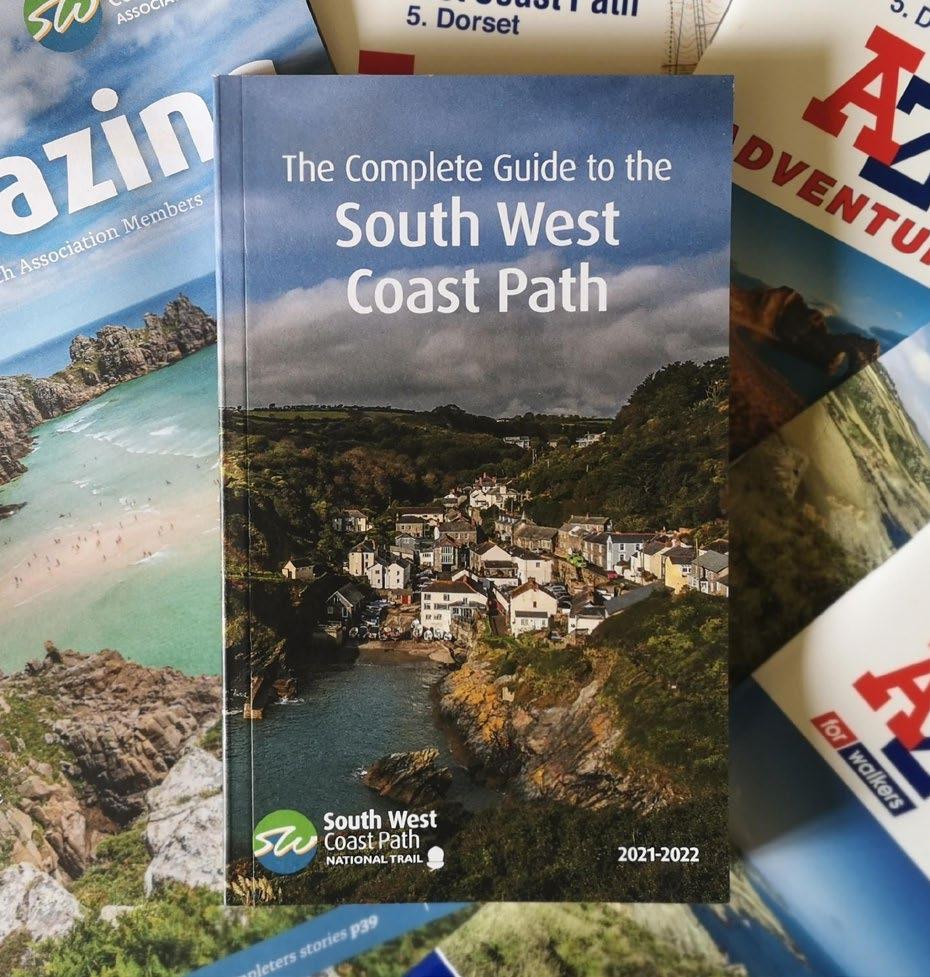
Running the charity
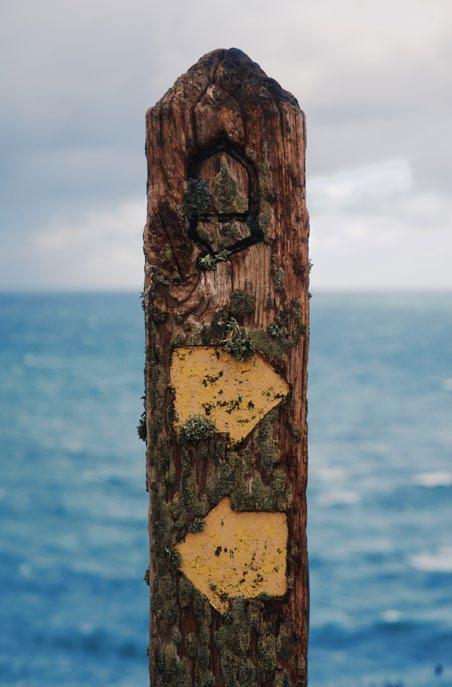
Way marker at Hells Mouth, West Cornwall. Photo by David Miller
Governance
The key Governance issue of the year was to ensure Trustees and team were able to communicate and respond effectively to sometimes rapidly changing and unknown scenarios. These difficulties were compounded by neither the Trustees or team being able to meet face-to-face for most of the year. The charity was already using technologies for remote communications and these became vital in a homeworking scenario. The officers of the Board (Chair, Vice-Chair, Hon. Secretary and Treasurer) set up a regular meeting with the Director between Board meetings to ensure smooth running of the charity in these unprecedented times and to provide a conduit so that Trustees were aware of any emerging issues. This additional arrangement supplemented the regular one on one meetings between the Chair and Director. The Board of Trustees meetings, SubCommittees, and Working Group meetings all moved to Videoconference. More details in the Structure, Governance and Management section on P.19
Annual General Meeting
The Association’s Annual General Meeting (AGM) was scheduled for June 11th in Minehead, Somerset. However, as virus control measures were introduced it quickly became clear that it would not be possible to host a physical event. Trustees agreed to postpone the AGM to 2021 and manage approval of the 2019 Report and Accounts remotely. Members were contacted and the report made available for review digitally or by post prior. The rules of the charity are that Trustees step down at each AGM and put themselves up for renomination. With no AGM to step down at, Trustees agreed to stay on in their roles for a further 12 months to ensure continuity during these challenging times. Trustees informed the Charity Commission of our decision to postpone the AGM under extraordinary circumstances.
Human Resources
A new sick pay policy developed at the end of 2019 was introduced at the beginning of 2020 to bring the team above basic statutory sick pay rules. At the beginning of the year a decision was made delay re-recruiting the Supporter Manager vacancy, and instead to use the funds in the shortterm to invest in IT systems to support membership and fundraising going forward. However, in response to the lockdown the IT contractors used by the Association were furloughed, delaying implementation of system upgrades. With the uncertainties around the emerging pandemic, it was decided to postpone recruitment to 2021. Following consultation, a new Impact Fundraising role is being developed in replacement and will be recruited in 2021. A wider organisational review planned for 2020 was also delayed as we tracked the impact of the pandemic and associated restrictions. A decision was made to put the review back to 2021 when staff are better able to meet faceto-face. From March, management of the Association team and wider family of volunteers was presented with a set of new challenges. The team responded quickly and professionally to the change in circumstances, having to adapt to working at home, in sometimes not ideal working conditions. Systems were put in place to review team sentiment and help improve the team’s morale, communications, and engagement – to compensate for the normal face-to-face contact in the office. With the team homeworking for a significant proportion of the year the charity’s Expenses Policy was updated throughout the year to support additional home equipment expenses and cover extra running costs for working at home. The Finance and HR Committee and team’s Health and Wellbeing Group also started a review of the Staff Handbook to bring it up-todate and make the document more coherent following piecemeal amendment over a number of years.
Trustee Recruitment
The Trustee Recruitment group undertook a review of the Skills Matrix and recommended that new Trustees were recruited with specific skills in: accountancy and finance; and health and wellbeing in the charity sector. The charity is committed to improving the diversity of our Board and we particularly welcomed applications from women, those in less represented communities and people with disabilities. The Association reached out to find suitable applicants and following a recruitment exercise, coopted David Morris in June and Hilary Dinsdale and Eve Bampton-Wilson in August.
Walker between Port Isaac and Padstow North Cornwall. Photo by Neil Ballard
Enquiries and Complaints
On average the charity receives over 1,000 enquiries a month, with only a third of these coming from members. With the team moving across to homeworking at short notice systems were put in place to manage enquiries. Our phone system had previously been switched to a digital Voice over IP (VOIP) system and so we were able to transition the system to working remotely. Other IT systems were not significantly impacted by the transition to homeworking. The charity dealt with several issues and complaints over the year. The most significant being our fulfilment service, sending out the wrong items to customers/members (due to temporary staff being in place during lockdown) – the issue was resolved and appropriate compensation provided. We received four complaints over the year down from seven in 2019. One issue was escalated to the Director, reviewed by Trustees, and a full response given.
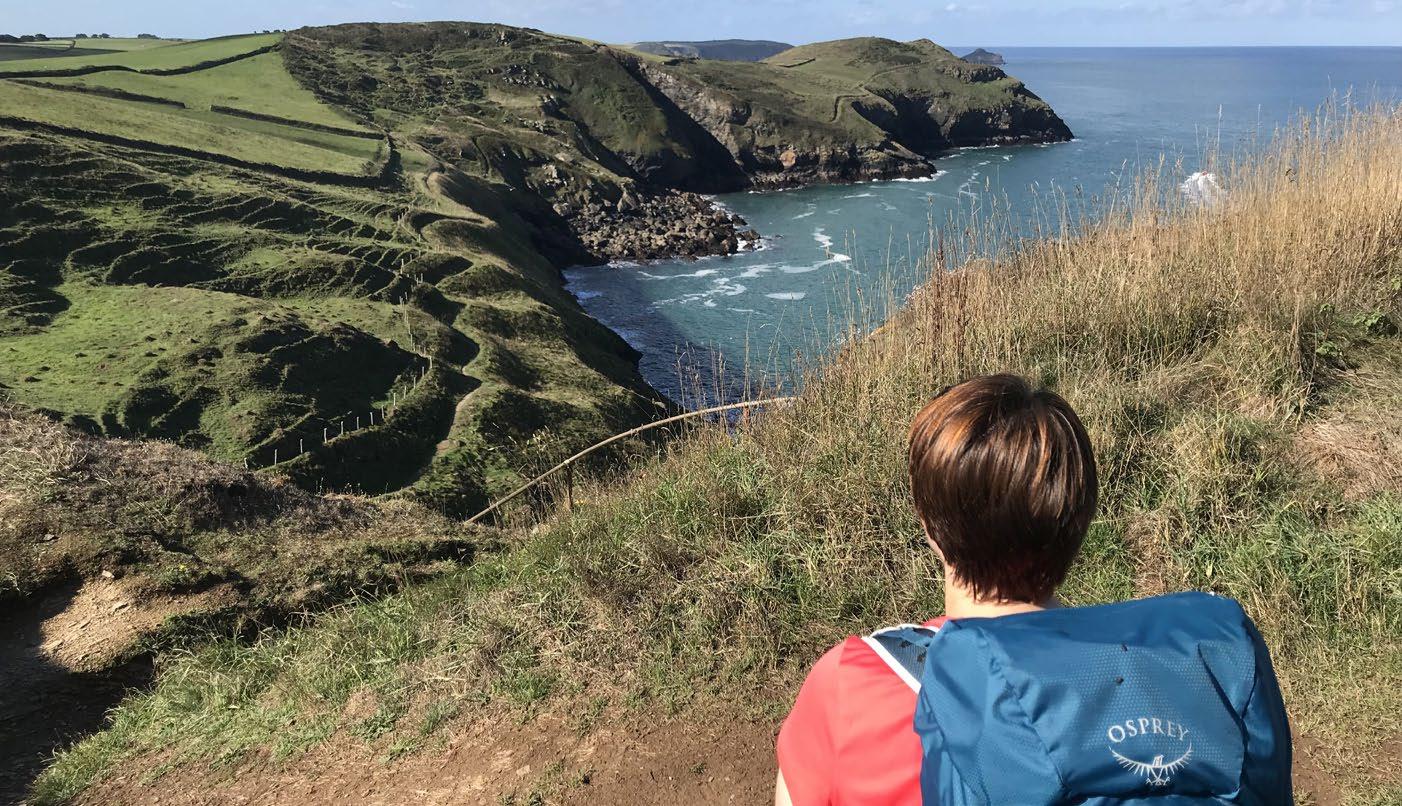
Achievements and Performance
Key Achievements
Over 2020 the charity has had to respond to a rapidly changing world and circumstances unprecedented in our lifetime. This has brought challenges to how we operate as a charity and changed not only how we worked over the year, but also our priorities and how we delivered them. Our first challenge key achievement was ensuring the Coast Path was open and available for people throughout the year. As with most of our work, this was done in partnership with the charity taking an enabling role. However, partners and contractors were significantly affected by covid-safe working restrictions and furloughed staff and the charity’s own team worked remotely for much of the year – bringing its own challenges. Meanwhile nature continued to take its toll on the Trails with the continuing impact of storms, extreme weather, and vegetation management including Ash dieback, along the 630 miles of the National Trail. So, just keeping the Path open was itself a challenge. Our second challenge and key achievement was communications and business continuity: keeping the team connected whilst working remotely; ensuring Trustees had up-to-date and accurate information on the impacts of the pandemic so timely and informed governance decisions could be made; communicating with Trail Partnership, stakeholders, media and wider trails family to share knowledge and experience as we navigated the pandemic; engaging with the thousands of businesses along the Coast Path whose livelihoods were put at risk by the pandemic; and ensuring our members and wider public were kept up-to-date with the latest guidance on restrictions and how to access the Trail safely. In terms of physical works on the ground, the four Rural Development Programme England (RDPE) bids accounted for the greatest proportion, bringing £750k investment (including £100k from the Association) across 47 improvement projects along and to the trail. In addition, the Path Committee committed a further £47k to a range of projects from installing new bridges, surfacing, steps, way-markers and rerouting the trail around cliff falls (see P.6). Work also continues with Natural England and local Trail Partners to identify future improvements that can be made to the route of the Coast Path through the England Coast Path designation process - to help ensure the Coast Path remains one of the world’s great walks. For many people the pandemic has shone a bright light on the importance of connecting with nature. The charity has used this as an opportunity to engage with people about the opportunities, initially online with many being excluded from accessing the Coast Path and then physically as restrictions released. The pressure on well know ‘honey-pot’ sites was made worse by many services being restricted or closed – especially public toilets and car parks. So, communicating where to go, how to get there and how to be safe when out on the Path was a vital role for the team, in addition to the usual notifying of diversions and other issues along the Trail.
The global phenomenon of people reconnecting with nature also helped underpin our equity of access work and strengthens the awareness of the Health and Wellbeing benefits of walking and being in nature and by water. The charity commissioned the University of Exeter to undertake research in this area (to be published in 2021) and set up a Trustee Working Group on Health and Wellbeing, building our capacity in this area, which will be much needed as the public move along the path to pandemic recovery. The creation of the business Way Maker programme was another key achievement. In the short-term, trying to support our Business Members during the crisis to help those who were able to re-open as restrictions lifted. In the long-term we hope that more closely aligning the businesses supporting people using the Coast Path – recognising that they are part of the Coast Path experience – will be beneficial to these businesses and the Path. This will help promote local distinctiveness, a sense of place, local provenance and at the same time raise awareness of the continuous effort needed for the Path to keep its well-deserved world class status.
Public Benefit Statement
The Trustees have reviewed the activities of the Charity in the light of the guidance published by the Charity Commission on public benefit. The Trustees are satisfied that the Charity’s activities are for the public benefit. The areas where public benefit is being provided are: • making improvements to the Path so that people using it gain the maximum enjoyment; • supporting path improvements to increase accessibility to and along the Coast Path for the public; • providing timely and accurate information on Covid-19 restrictions, access to and along the Coast Path; • promoting the health and wellbeing benefits of walking along the Path; • encouraging recognition of the benefits of the path corridor for wider nature recovery; • improvements to increase the use of the Path out of season; • increased publicity to promote the walk to the widest section of the population; • working with partners to identify and address barriers to access; and • close working with other National Trails and world trails to promote the public benefits they offer.
Financial Review
Key Financial Performance Indicators 2020 Annual Report
The Charity receives income from a variety of sources and for 2020 this comprised:
Source
Grants 40% Memberships 21% Donations, Gift Aid 19% and Legacies Way Makers & 10% Corporate Sponsorship Shop Sales 10%
Total 100%
During the year ending 31 December 2020, the Charity received total income of £540k and incurred total expenditure of £498k which resulted in net income of £42k. In common with many other organisations, the Charity faced significant challenges arising from the Covid-19 pandemic. However, it continued to adopt a proactive approach to income generation and was rewarded by the receipt of additional grants. In addition, donations and member subscriptions were maintained at near budgeted levels. Expenditure on path repairs was lower than originally planned, as several schemes were delayed as a result of the impact of Covid-19 on the availability of contractors to undertake the work. These projects will be completed in 2021.
Investment Policy and Performance
The Charity has a policy of low-risk investment in financial institutions which offer ethical products. All reserves are placed in interest bearing cash deposits within a variety of accounts, in order to keep within the Financial Services Compensation Scheme limit of £85k. The Finance and HR Committee and Trustees receive regular reports relating to account balances and interest rates.
Going Concern
An entity prepares financial statements on a going concern basis when, under the going concern assumption, the entity is viewed as continuing in business for the foreseeable future. After making appropriate enquiries, the Trustees have a reasonable expectation that the Charity has adequate resources to continue in operational existence for the foreseeable future. For this reason, they continue to adopt the going concern basis in preparing the financial statements.
Membership Pack
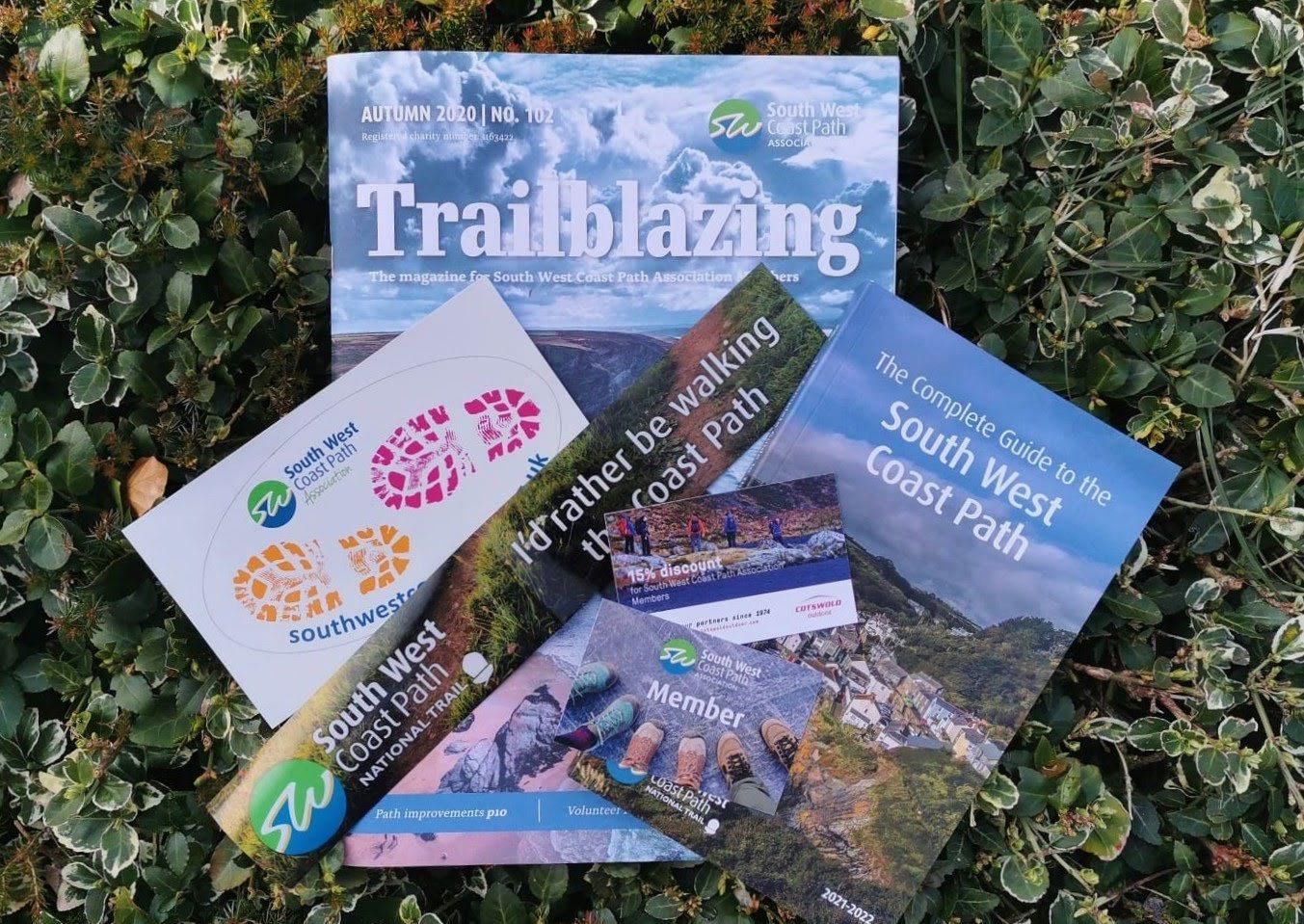
Principal Risks and Uncertainties
The principal risks, based on likelihood and impact, faced by the Charity in 2020 were: • Reduction of funding by local and national government • Impact on regional development grant funding by the United
Kingdom’s decision to leave the European Union • The effect of the Covid-19 pandemic on the ability to operate effectively and generate income
Trustees manage these risks by recording them in a Register and defining a set of activities to reduce, manage or mitigate the risk were it to be realised. Trustees regularly review these activities to ensure the Charity is appropriately prepared. Other risks identified in the risk register include:
Insufficient governance / leadership at Trustee level
Loss of key management personnel
Failing in the Trail
Partnership Impact of the economic climate on financial sustainability Insufficient or failing in administration or IT systems Environmental disasters in the South West impacting on the Path or the ability to access the countryside Damage to SWCPA Reputation and Brand.
Reserves Policy
At the year end the Charity had total reserves of £814k which comprises: • Restricted reserves of £30k – restricted for specific uses as specified in the conditions attached to their source from legacies, grants and donations. • Designated reserves of £615k – designated by the
Trustees for capacity building, contribution towards the delivery of the
Trail Partnership Project and to promote and protect the Coast Path. • Unrestricted reserves of £169k – these reserves are needed to bridge any gaps that arise between spending and income received due to unforeseen circumstances which are outside of the Association’s control. For example, this might include the impact of national economic conditions on our ability to generate income or the need to deal with emergency repairs. The Charity’s reserves policy is intended to ensure the Charity has sufficient unrestricted reserves to meet up to 6 months of our day to day running(“operational”) costs. The level of reserves is reviewed at least twice a year by the Finance and HR Committee, and not only reflects the relevant period in the current financial year but also takes into account the pressures on our budget moving forward. The Reserves Policy target was met in 2020.
Structure, Governance and Management
Governing Document
The South West Coast Path Association is a Charitable Incorporated Organisation (CIO) governed by its Constitution approved by members on 28th March 2015 and subsequently accepted by the Charity Commission on 4th September 2015. It is registered as a Charity with the Charity Commission.
Method of Appointment or Election of Trustees
The management of the charity is the responsibility of the Trustees who are elected and co opted under the terms of the Constitution. Trustees are elected every year by members at the AGM, serving until the following AGM. All Trustees are eligible for re election each year. The procedure governing this process is set out in the Constitution and Rules. Officers (Chairman, Vice Chairman, Hon Secretary and Treasurer) are elected by the Trustees at the first meeting of the Board of Trustees following AGM. Members are informed at AGM of the names of those Trustees intending to stand for the Officer positions. A maximum of twelve Trustees are permitted under the current Constitution. Trustees may co opt additional Trustees between AGMs, so long as the total does not exceed twelve. The Trustee Recruitment Working Group reviewed the Trustees diversity and skills matrix and advised on skills gaps within the Board.
Organisational Structure and Decision Making
The Board of Trustees host four formal meetings a year at Headquarters with occasional conference calls, as required, between meetings. A further two meetings are held to focus upon project delivery with a site visit including relevant staff in the spring (cancelled in 2020 due to Coronavirus restrictions), and the second to consider the progress and review of the Business Plan in the autumn. The Board has established and monitors the overall governance of the Charity and determines membership, terms of reference and procedures of committees and other groups. It receives reports and recommendations from its committees for ratification. All Trustees have access to the minutes of committees allowing scrutiny of their discussions and activities. The Board has the power to create Working Groups to perform specific tasks over a limited timescale. The following decisions are reserved to the Board of Trustees: to consider any proposals for changes to the status or constitution of the Charity and its committee structure, to appoint or remove the Chairman and/or Vice Chairman, to approve the budget, to approve changes to membership subscription rates. The Trustees are responsible for setting general policy, adopting a Business Plan and budget, approving the statutory accounts, monitoring Charity performance with the use of budgets and other data, evaluating and mitigating risks, and making major decisions about the direction of the Charity, capital expenditure and resources. Over 2020 the Associations new Sick Pay policy was implemented, and Expenses Policy updated. A revised Complaints Policy and Procedures was also reviewed and adopted by the Board of Trustees.
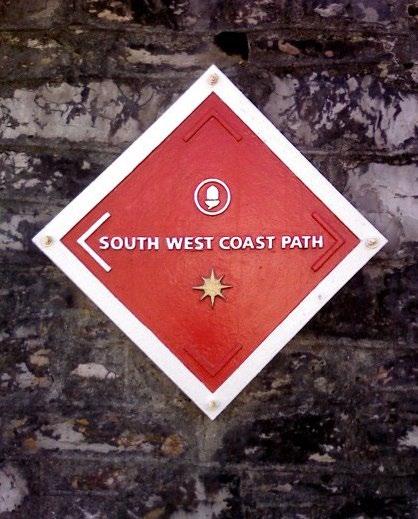
South West Coast Path sign in Plymouth In 2020 the Board was not able to hold its normal face to face Business Plan review in the Autumn but agreed a timetable and process that would allow videoconference meetings to take place. This ensured each Committee had the opportunity to input before a revised Business Plan draft was considered by the Board for approval in November.
Committees and Working Groups
In 2020 there were three committees and three working groups:
Path Committee
This is the primary group which looks after operational matters concerned with the Path. It meets four times a year allowing all Trustees to attend as observers. Membership is comprised of the Area Reps, a Rambler’s representative, the National Trail Officer, two Trustees, the Association Director and an independent Chair. One of its main purposes is to review requests and approve the allocation of the Charity’s own resources to projects. In 2020 the Chair was Steve Church.
Finance and HR Committee
This meets at least three times a year and is responsible for all substantial matters of finance including human resources. This includes, but is not limited to, approving funding bids, approving the Charity’s quarterly management accounts, approval of the annual budget and the appointment of the Charity’s legal and financial advisers. Finance policies are developed by the Committee and approved by the Board of Trustees whereas finance procedures are owned and maintained by the Committee. Membership includes the Chairman, Treasurer, Finance Officer, Director plus at least one other Trustee. Mike Tithecott was Treasurer in 2020.
Membership and Fundraising Committee
The Membership and Fundraising Committee’s main objectives are to oversee the fundraising and engagement work of the Charity set out in the Business Plan. This includes membership, corporate support, trusts and grants, individual giving, events, trading activity and communications.
Membership of the Committee comprises at least three Trustees and two voting Association staff. Other non-voting staff are co-opted to the Committee. In 2020 the Chair was Philip Spencer.
Planning Working Group
The Planning Working Group has oversight of planning policy impacting on the Coast Path. In addition, it responds to planning applications, advises on neighbourhood plans and inputs to policy (e.g. Green infrastructure and National Planning Policy Framework). The Group comprises the Association’s Chair, Path Committee Chair, Volunteer Planning Advisers, Association’s Director and the National Trail Officer. This Working Group reports to the Path Committee.
Recruitment Working Group
The Trustee Recruitment Working Group was set up to address the issues around skills and diversity in membership of the Board. A review of the Trustees skills and diversity matrix was completed and reported back to the Board. The Working Group comprises three Trustees and the Association’s Director and reports to the Board of Trustees and is Chaired by Peter Scupholme.
Health and Wellbeing Working Group
The Trustee Health and Wellbeing Working Group was set up to give strategic direction to health and wellbeing work across the charity, looking to maximise impact of our programmes across the Coast Path. The Working Group comprises three Trustees and the Association’s Director and reports to the Board of Trustees and is Chaired by Carol Grant.
Key Management
The Board of Trustees have devolved responsibility for day-to-day management of the Charity to the Director. The Director implements the policies laid down by the Trustees and reports back to them on performance. The Trustees have approved a Scheme of Delegation between the Trustees and Director. This forms part of the Charity’s Rules and grants the Director latitude to act within the scope of the approved annual or project budget and within the Business Plan. The Business Plan has identified Lead Trustees for specific work items and the Director is authorised to proceed subject to consultation with the Lead Trustees, rather than the full Board. Discretionary spend up to £2,000 on items not in either the annual budget or project budgets is permitted by the Scheme.
Related Party and Other Connected Charities and Organisations
None of our Trustees receive remuneration or other benefit from their work with the Charity. Trustees are required to complete an annual Declaration of Interests as well as to state any conflicts of interest before the start of each Board meeting. Trustees are also required to pass the HMRC “fit and proper” test as the Charity makes claims for tax relief.
Plans for Future Periods
Future Developments
Our priority for the Association in 2021 will be to continue to deliver the Business Plan as efficiently and effectively as possible under challenging economic and physical environment conditions. At time of writing there are some specific programmes of activity we will focus on over 2021, including: • work with the National
Trust, Dorset Council and
Cornwall Council to complete delivery of RDPE funded capital improvements along, and links to, the Coast Path; • liaise with the England
Coast Path designation team to maximise benefits for coastal access along the
Path corridor and champion the best route for the England Coast Path in the South West; • work with the SWCP Trails
Partnership to develop a future proofing strategy for the Coast Path including declaration of a climate emergency for the
Coast Path; • continue to pilot and scale up Connecting Actively with Nature health and wellbeing projects (including Couch to Coast) to reconnect people with the coastal environment with a strong focus on mental health and equity of access projects and partnerships; • work with VisitBritain,
National Coastal Tourism
Academy and Natural
England to promote Year of the Coast 2023 coinciding with the 50th anniversary celebrations for the Association; • continue to build our Every
Mile Matters awareness and fundraising campaign to show how the Coast
Path is delivering the sustainability agenda, leveraging the G7 Summit and Cop 26 in 2021; • Increase our understanding of the Coast
Path and its benefits through research partnerships; • work with the World Trails
Network to show how trails can be used to help with the path to recovery post-covid and address/ mitigate the continuing climate change challenge; • trial digital engagement and fundraising on the trail to innovate and test technology including delivery and promotion of the VistaAR Climate Trail; • work with government and
National Trails
Partnerships to ensure secure long-term core funding for maintenance of National Trails in parity with the rest of the protected landscape family; and • work with the National
Trails Partnerships to set up a National Trails
Alliance.
Cruise Ship finding some shelter from the storm Portland, Dorset. Photo by David Miller
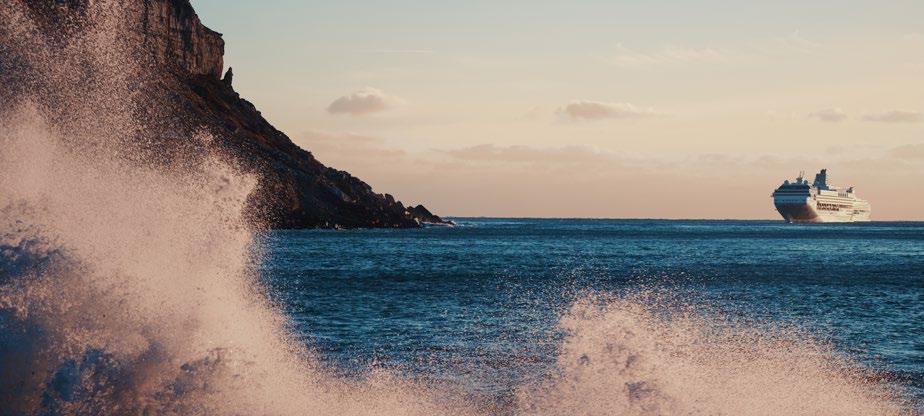
Trustee’s Responsibilities Statement
The Trustees are responsible for preparing the Trustees’ report and the financial statements in accordance with applicable law and United Kingdom Accounting Standards (United Kingdom Generally Accepted Accounting Practice). The law applicable to charities in England and Wales requires the Trustees to prepare financial statements for each financial year which give a true and fair view of the state of affairs of the charity and of the incoming resources and application of resources of the charity for that period. In preparing these financial statements, the Trustees are required to: • select suitable accounting policies and then apply them consistently; • observe the methods and principles in the Charities
SORP; • make judgments and accounting estimates that are reasonable and prudent; • prepare the financial statements on the going concern basis unless it is inappropriate to presume that the charity will continue in operation.
The Trustees are responsible for keeping proper accounting records that are sufficient to show and explain the charity’s transactions and disclose with reasonable accuracy at any time the financial position of the charity and enable them to ensure that the financial statements comply with the Charities Act 2011, the Charity (Accounts and Reports) Regulations 2008 and the provisions of the trust deed. They are also responsible for safeguarding the assets of the charity and hence for taking reasonable steps for the prevention and detection of fraud and other irregularities. This report was approved by the Trustees, on and signed on their behalf by:



